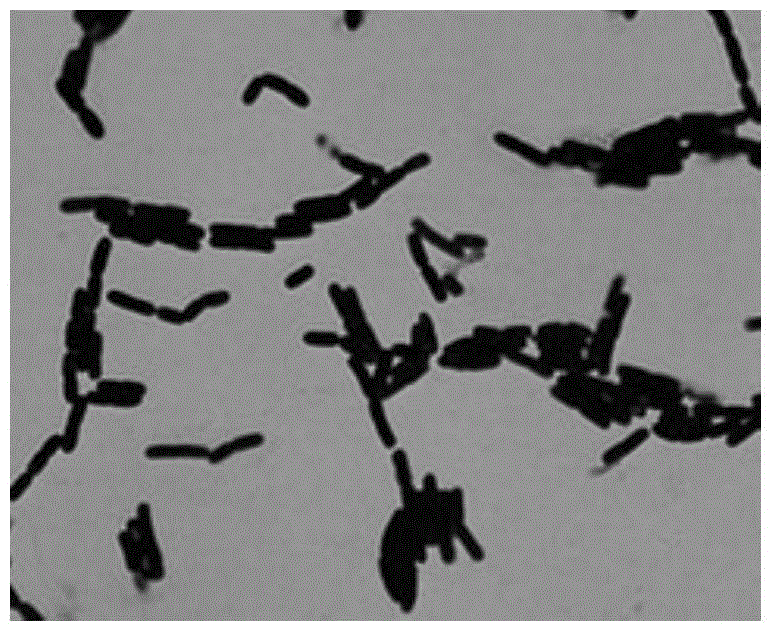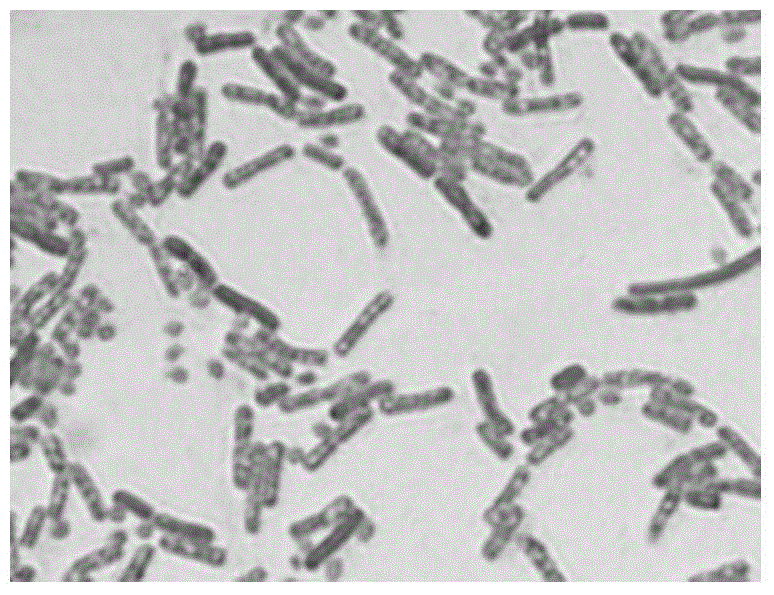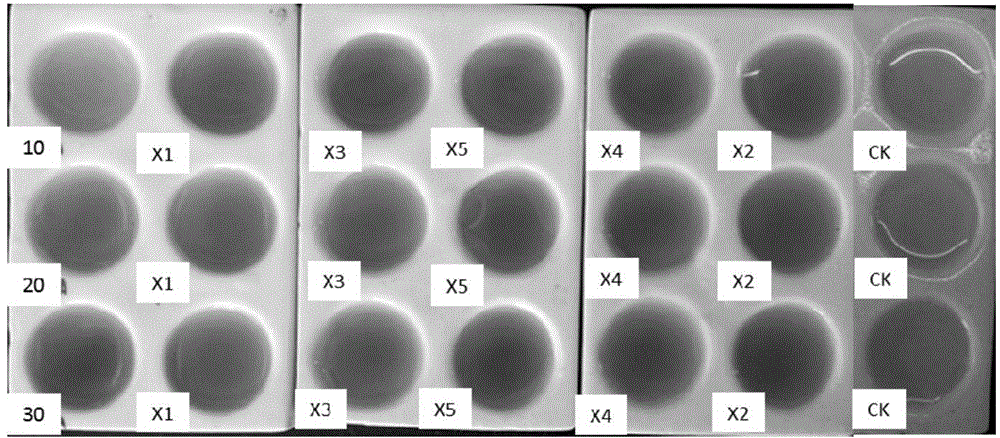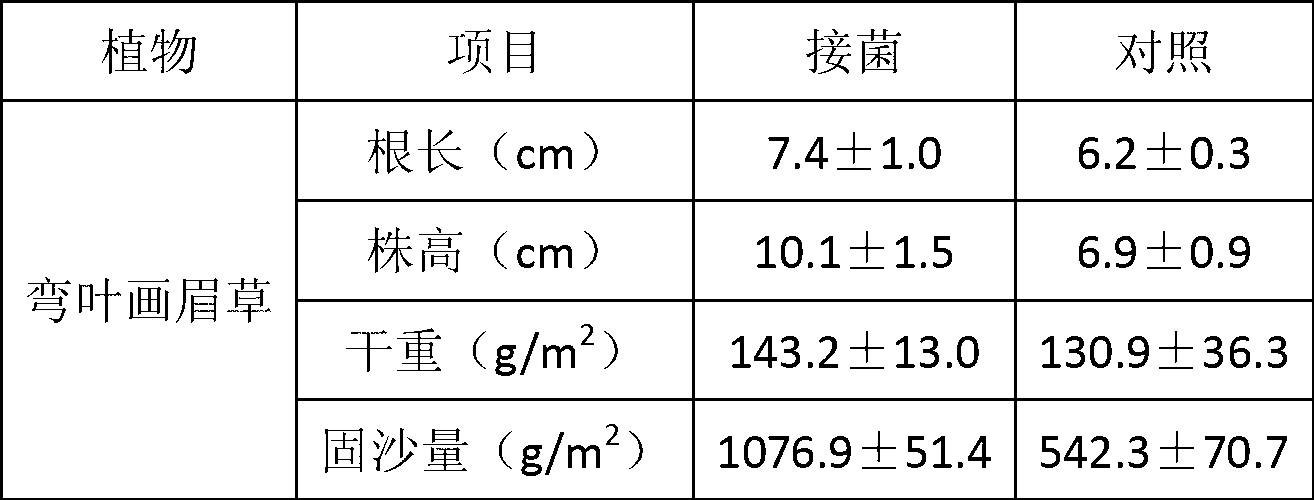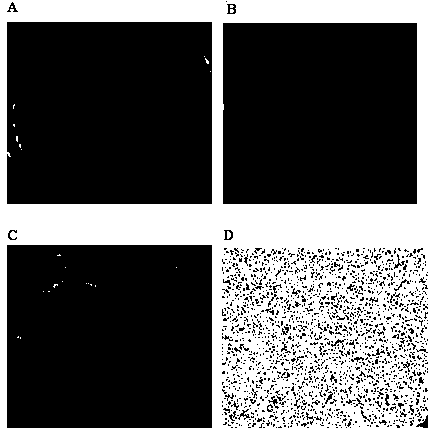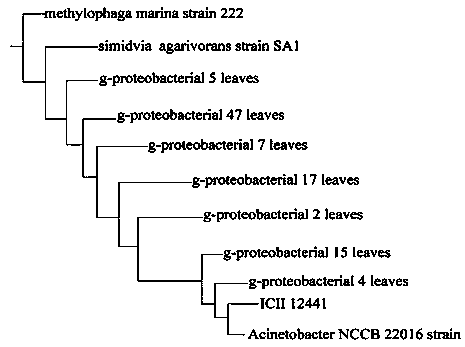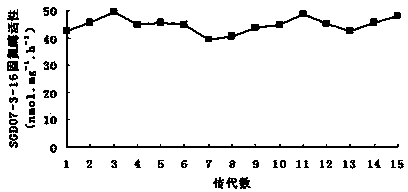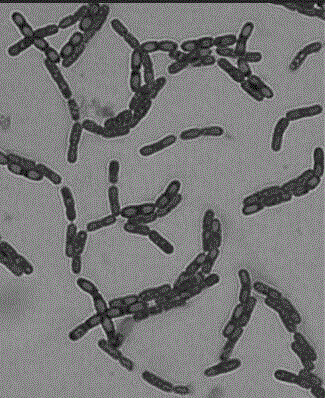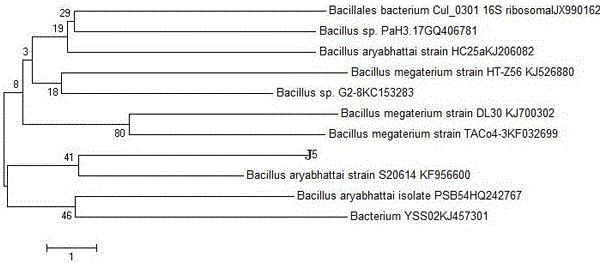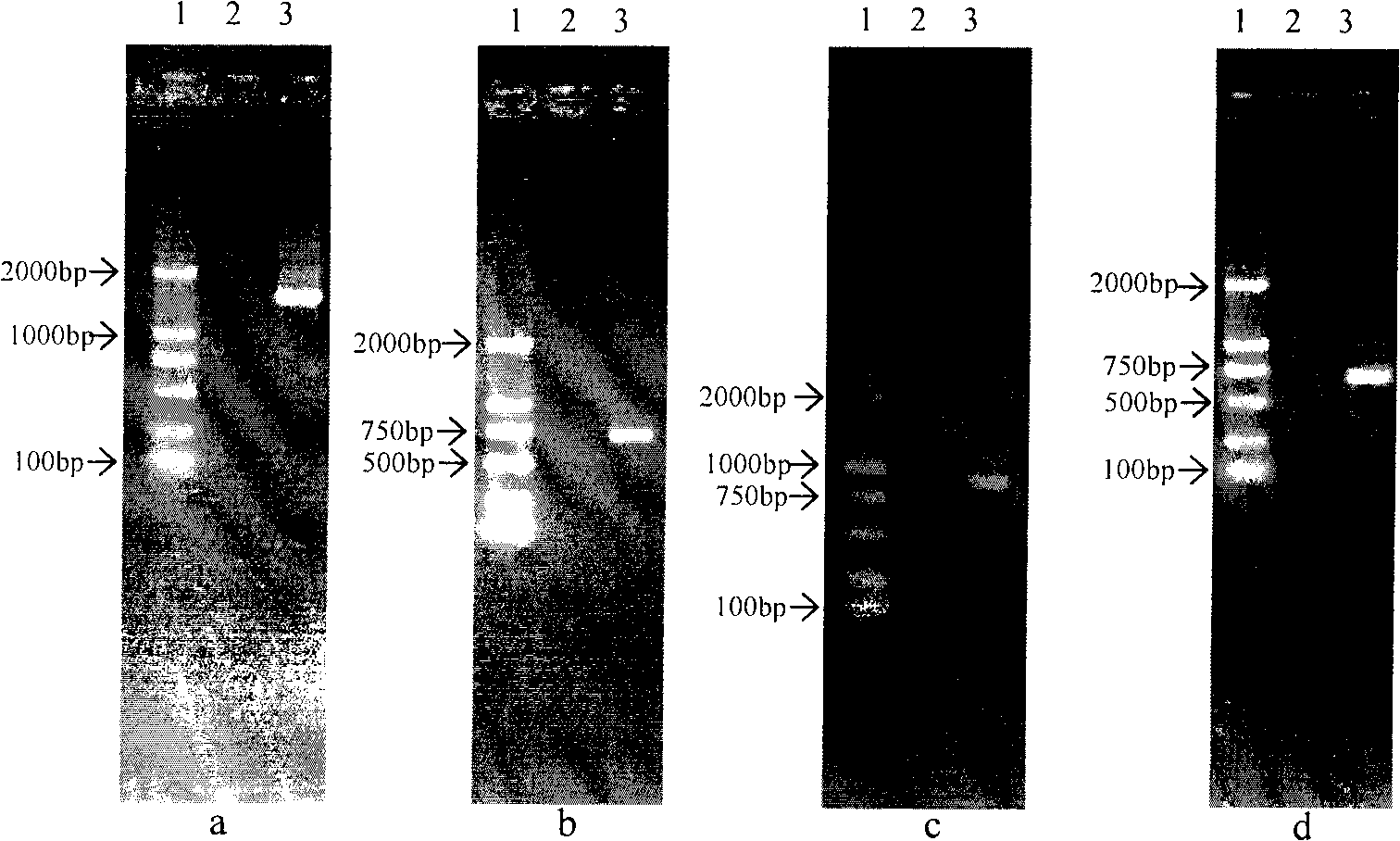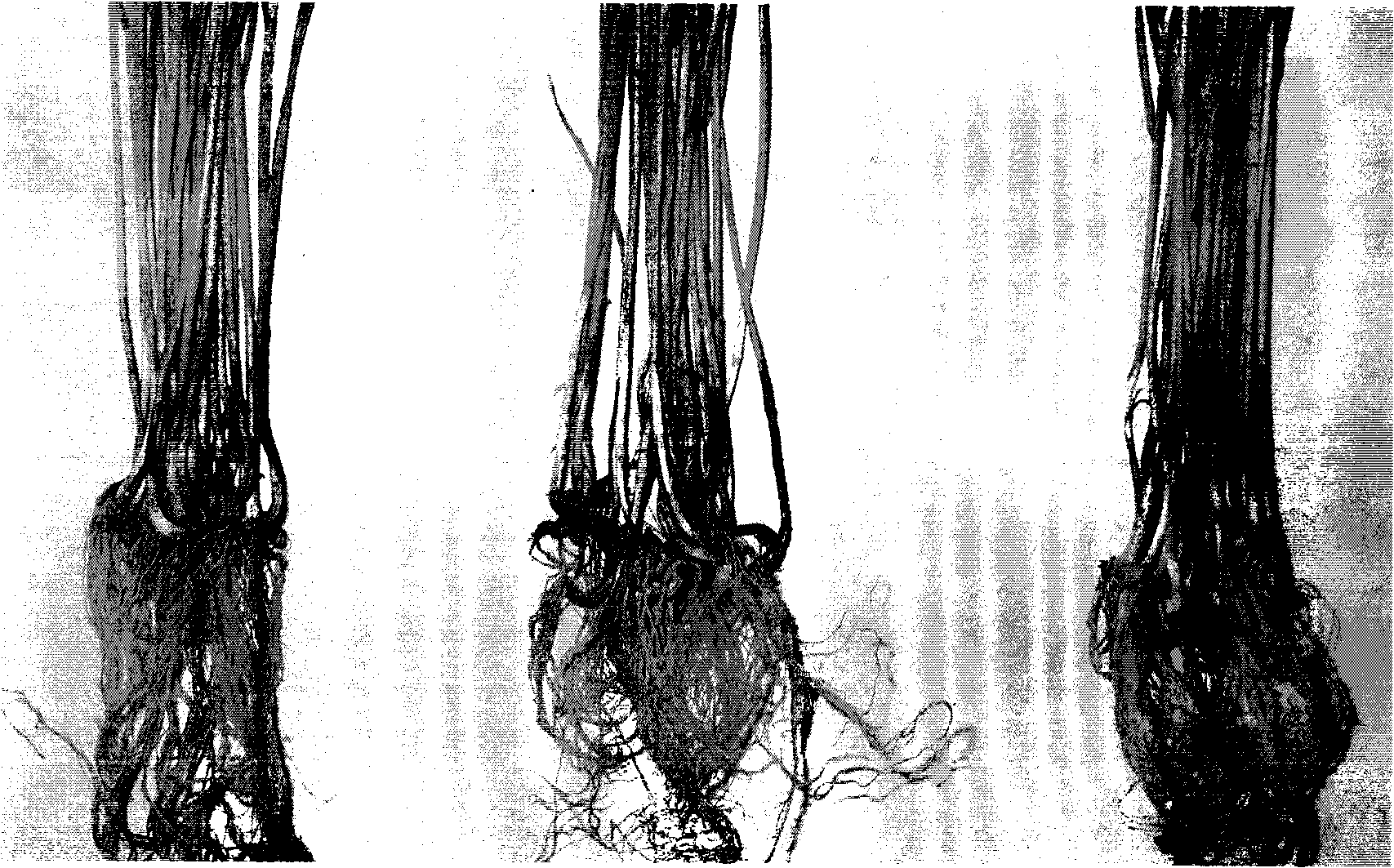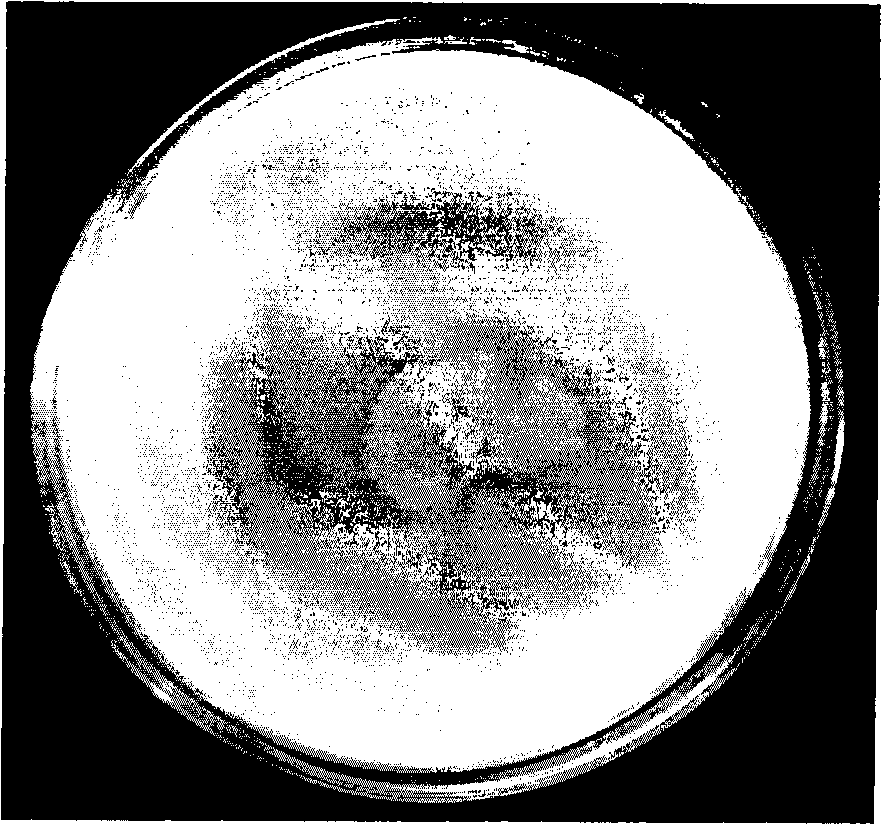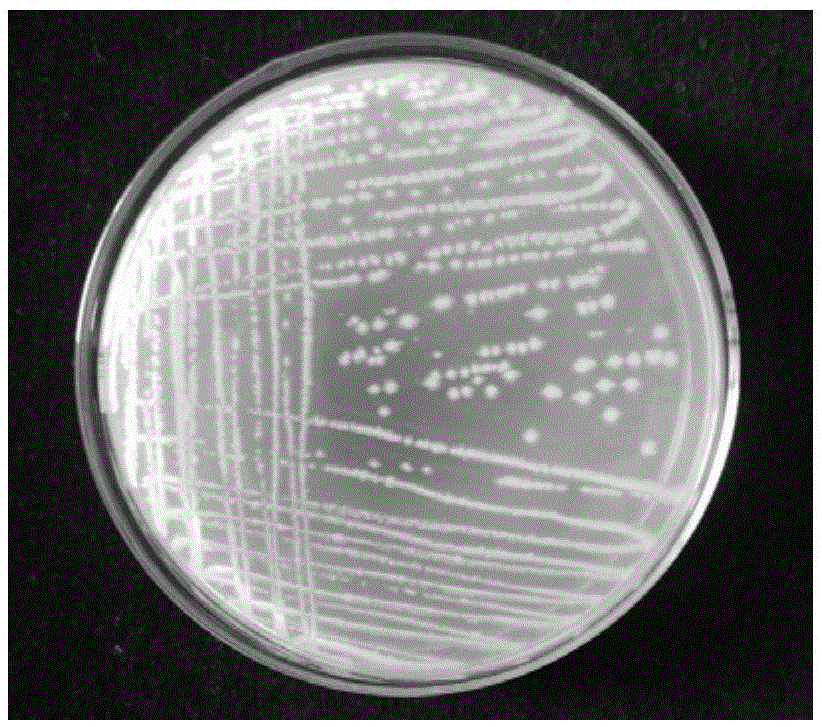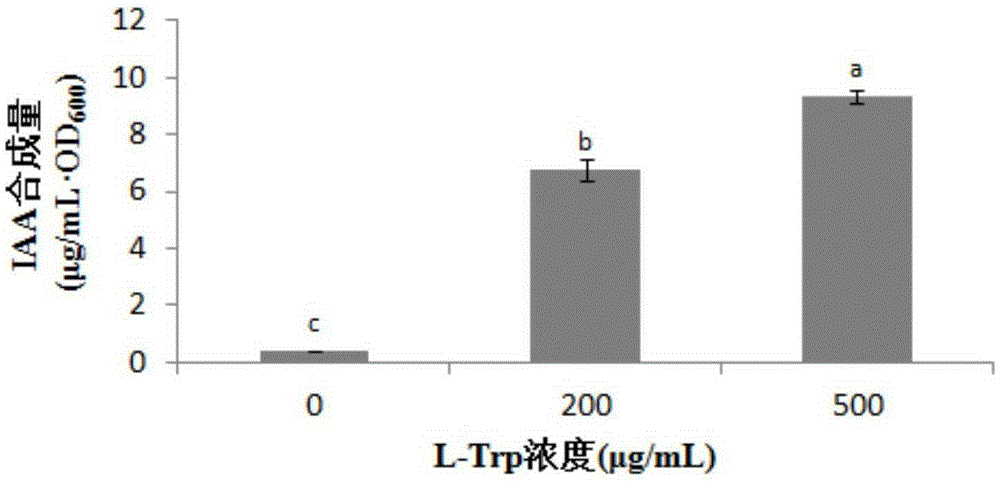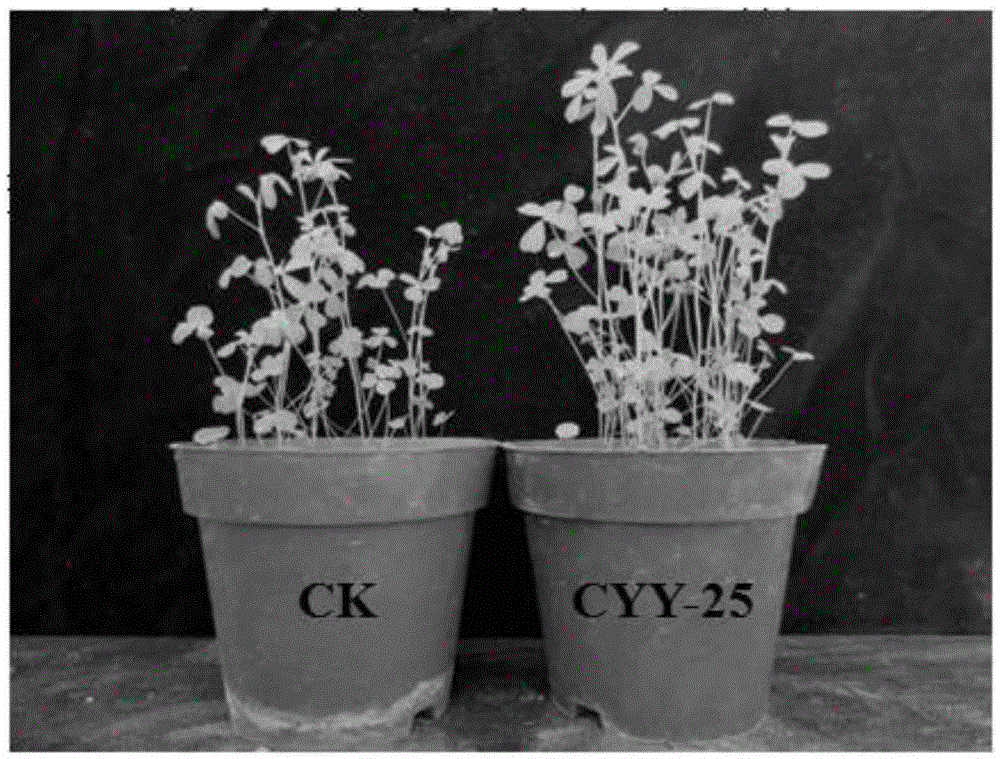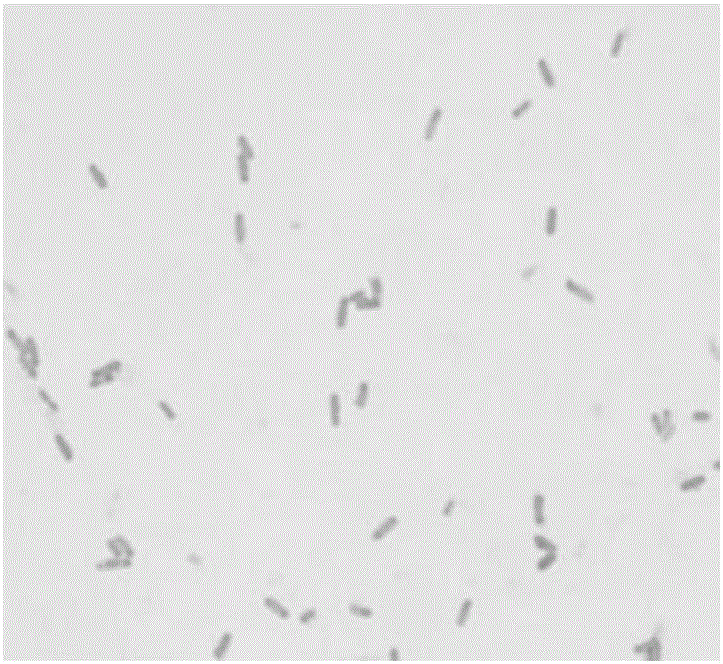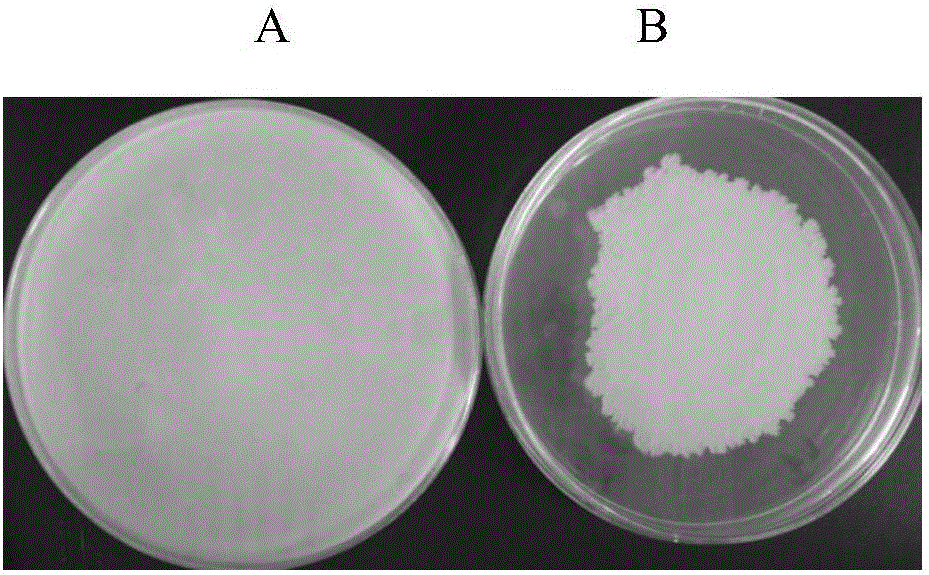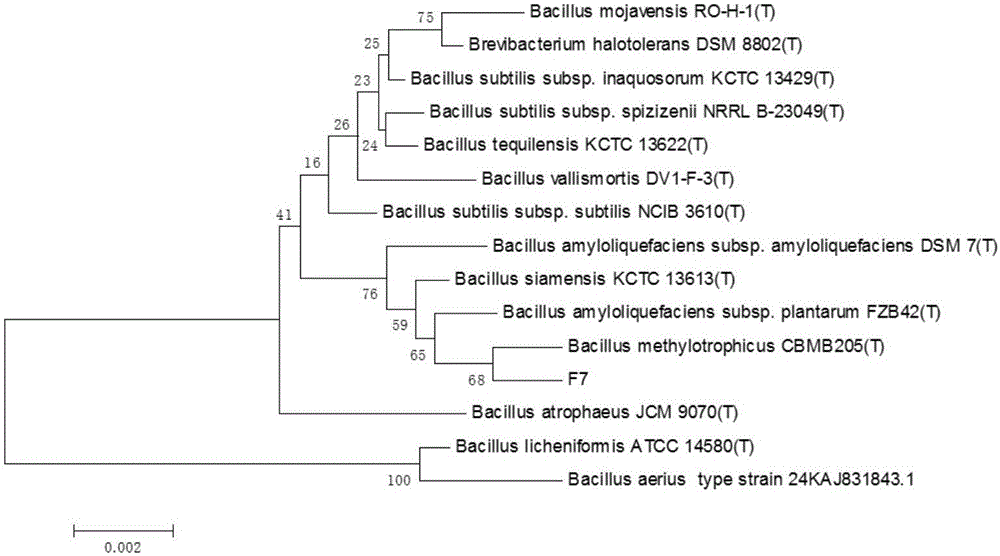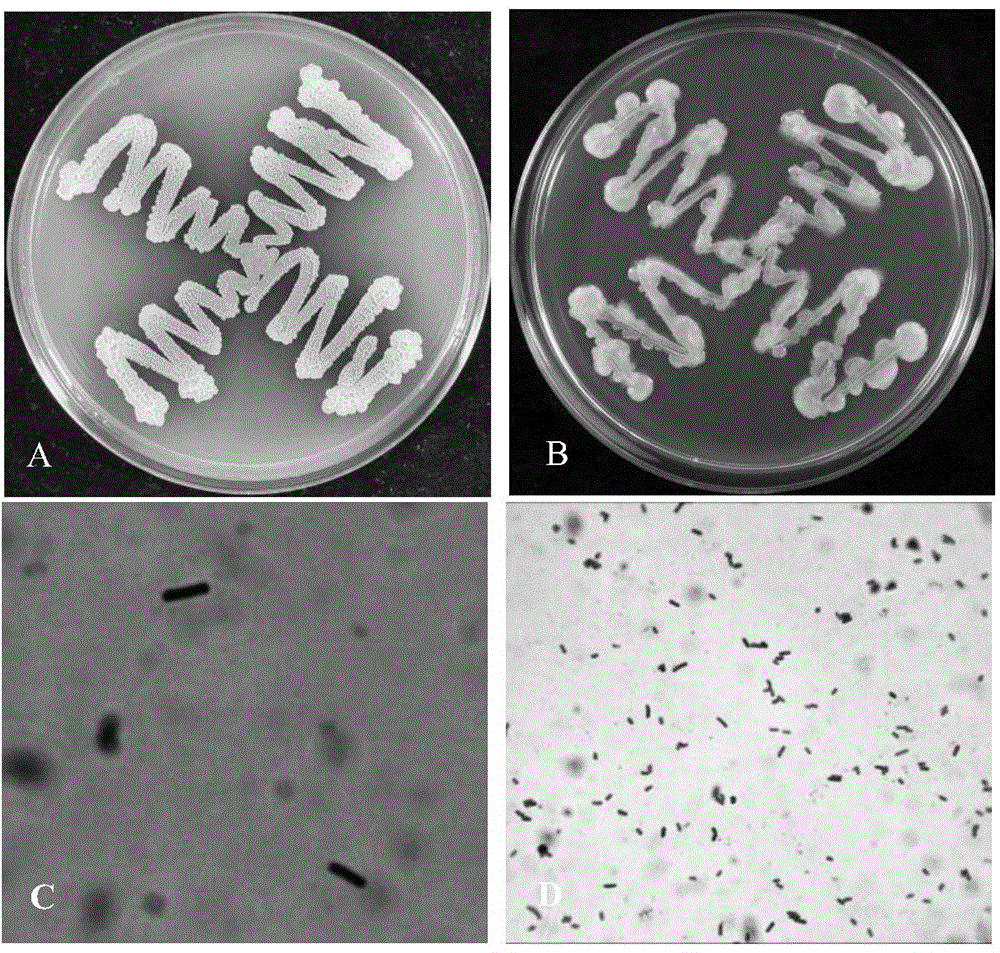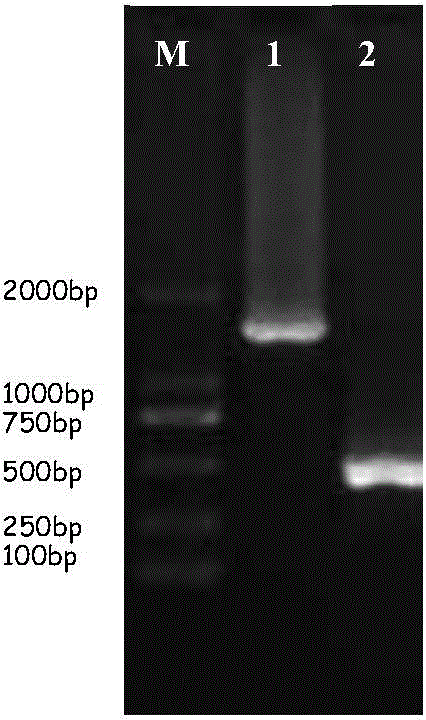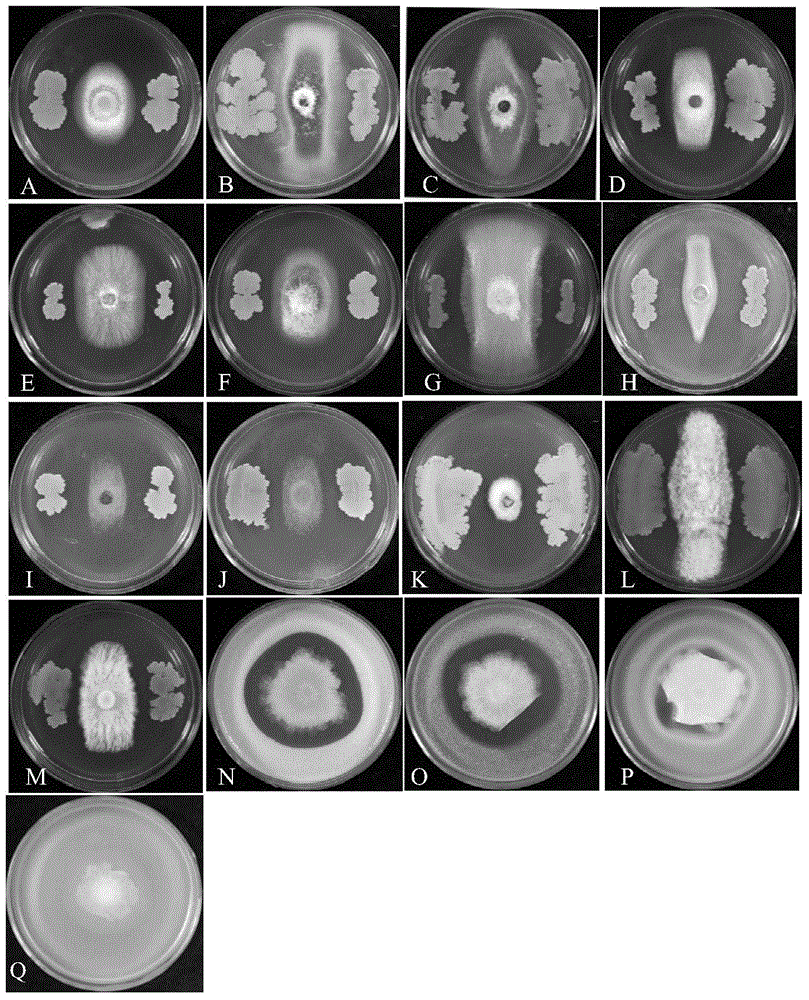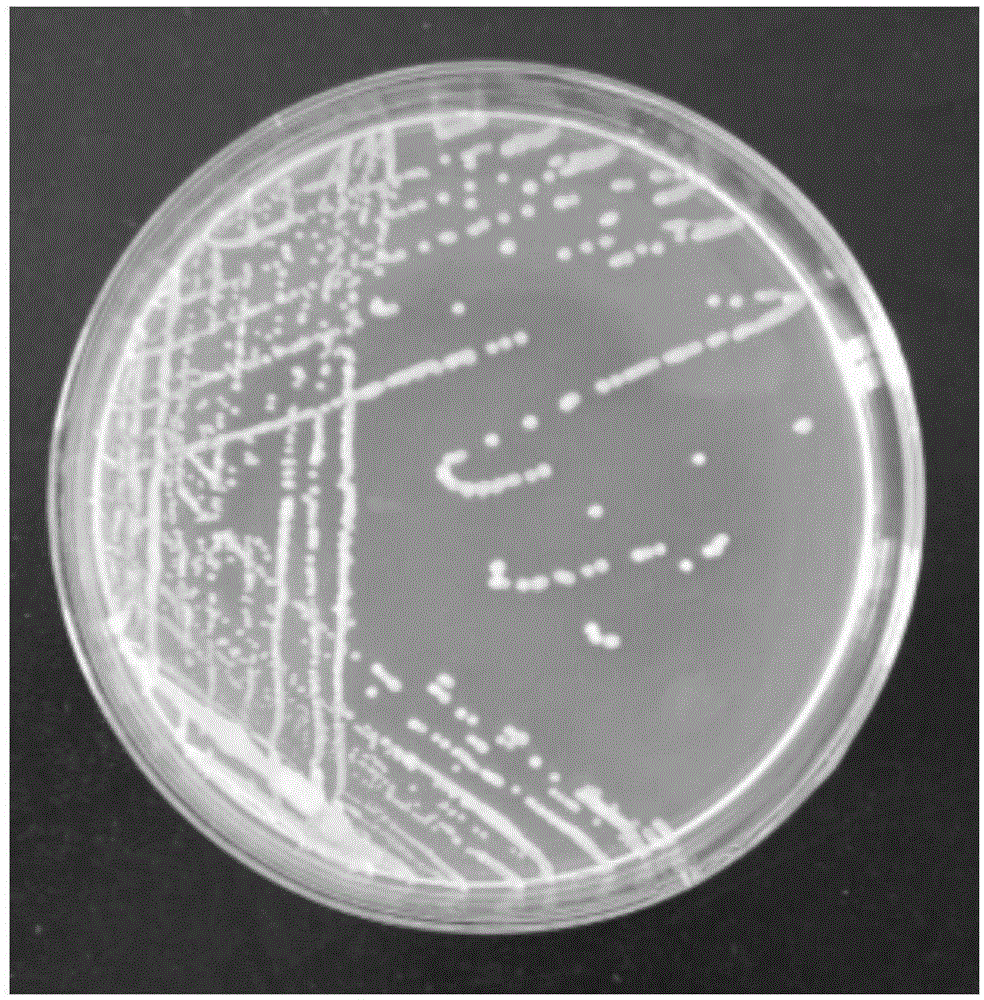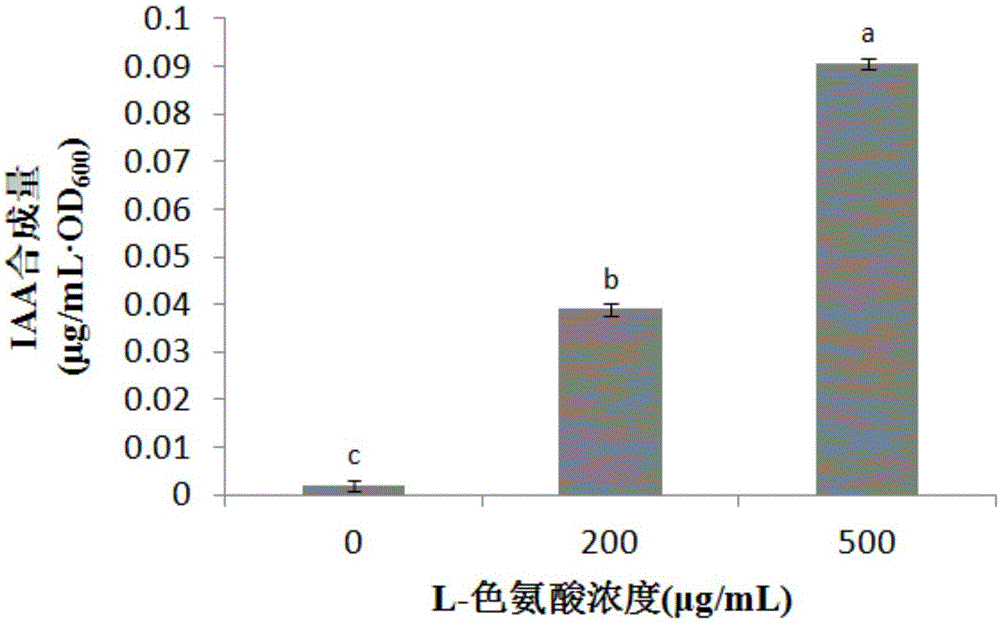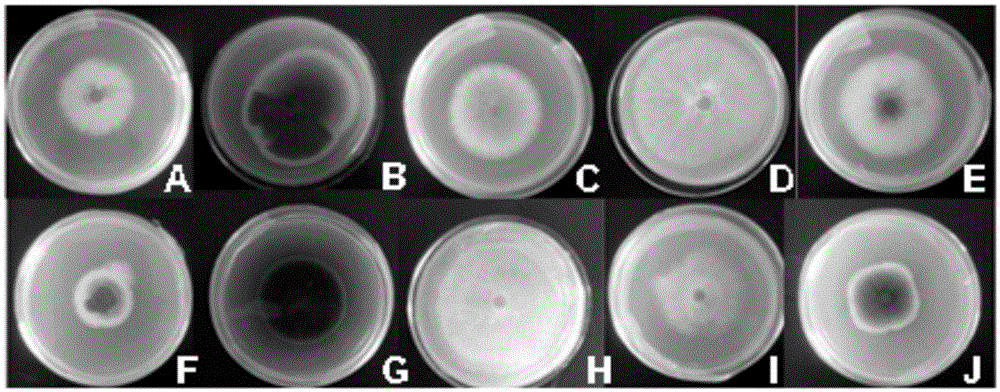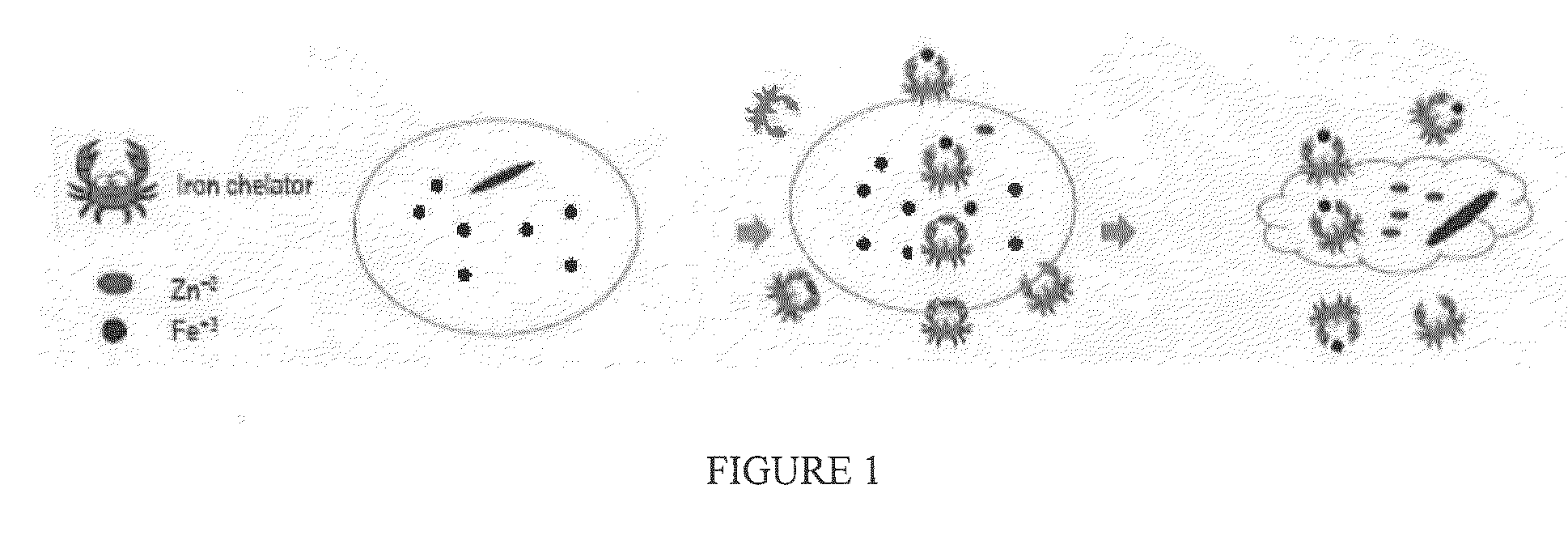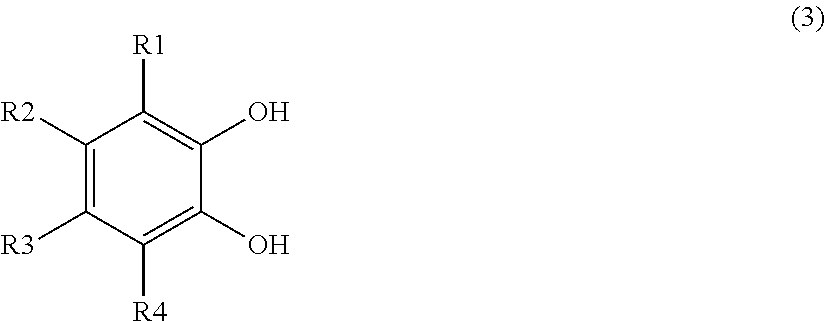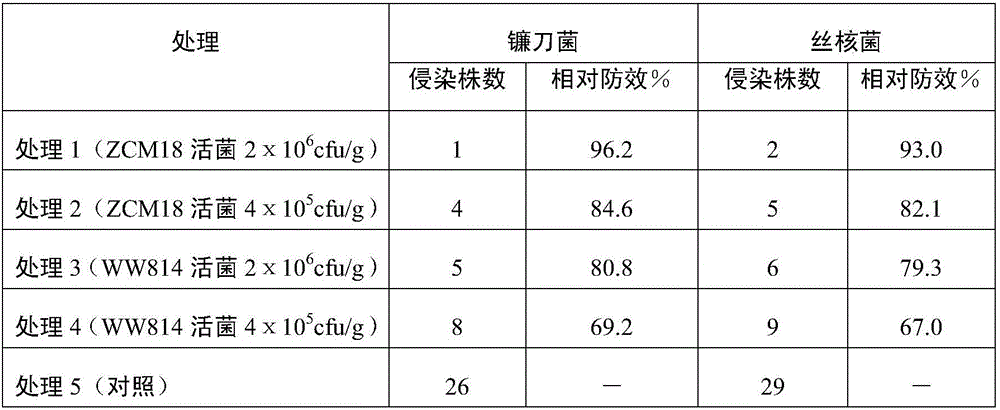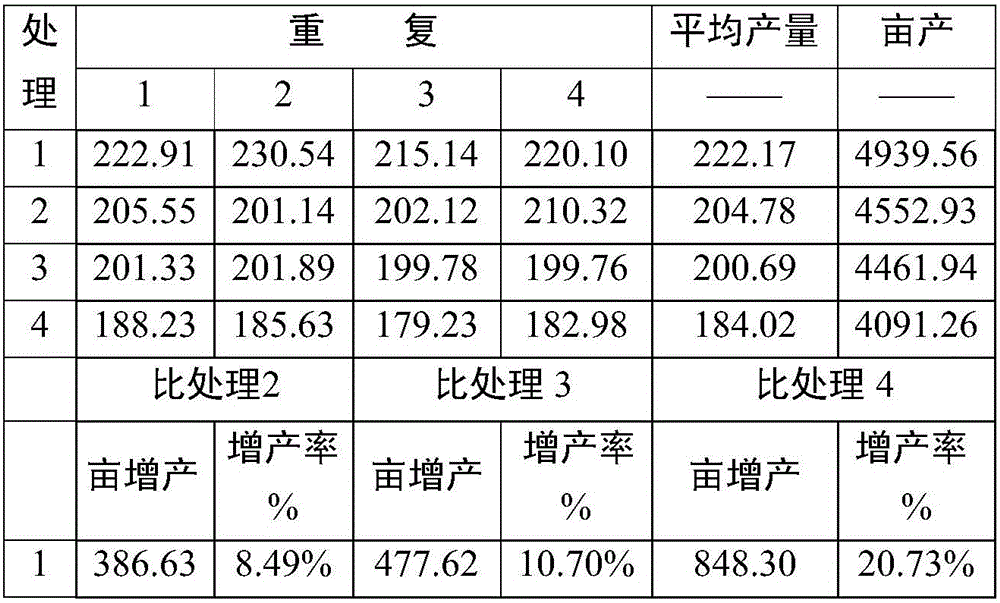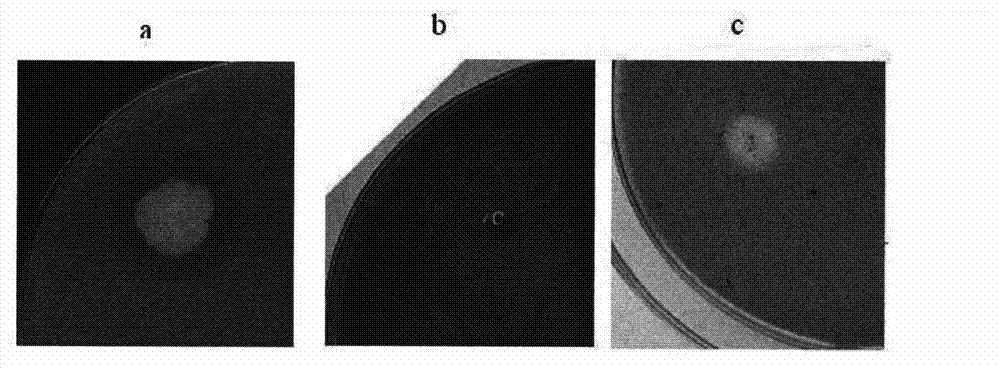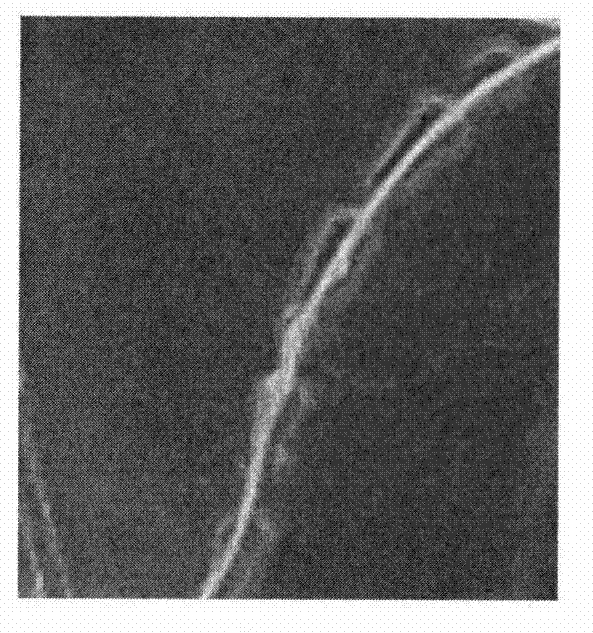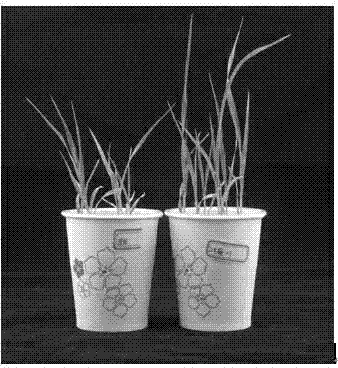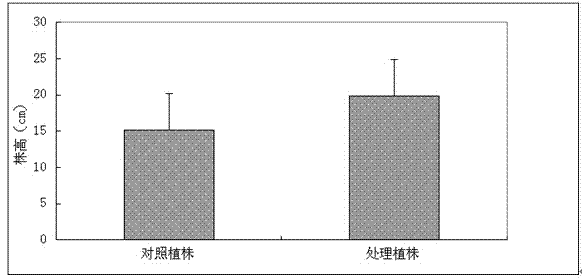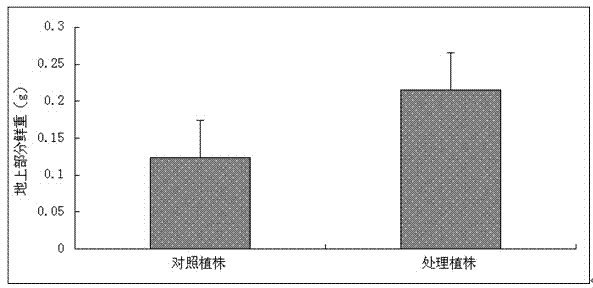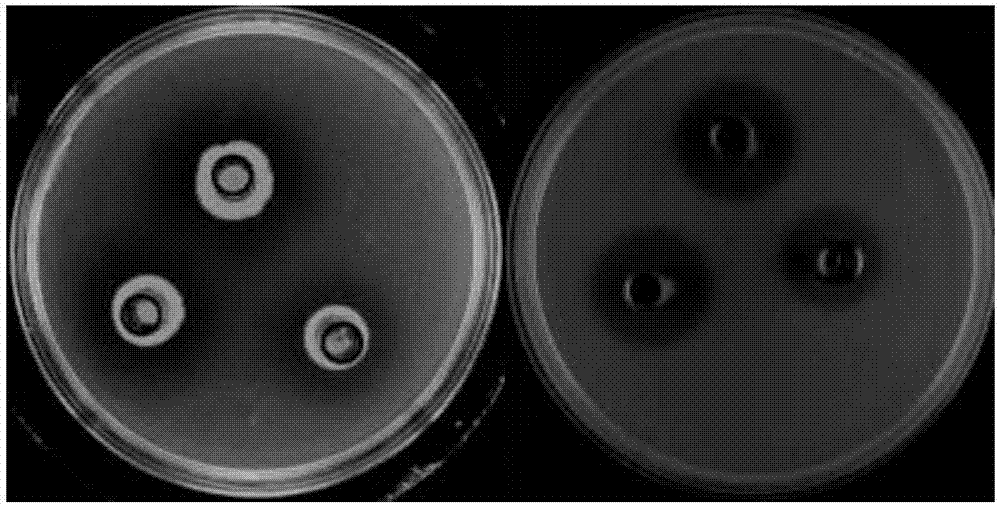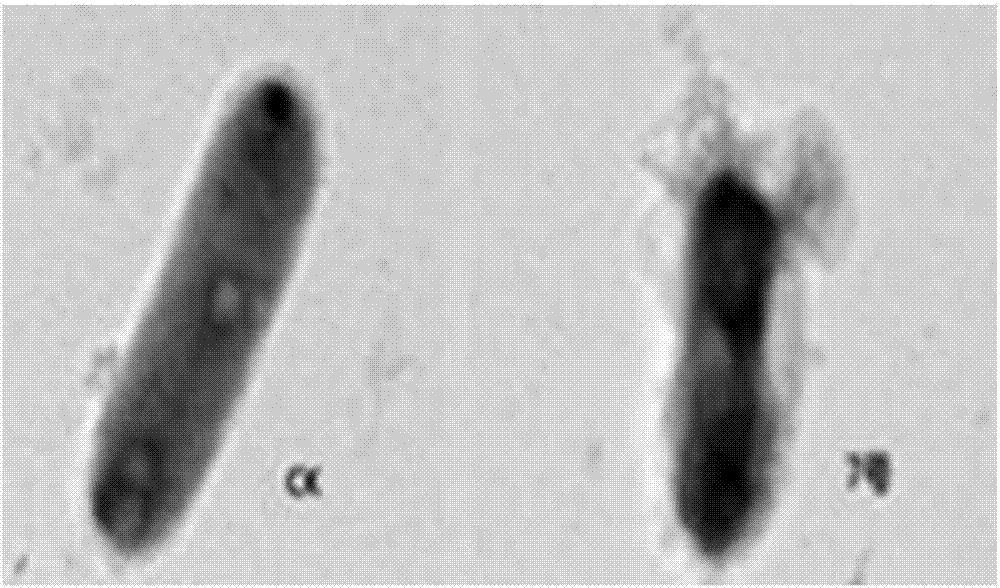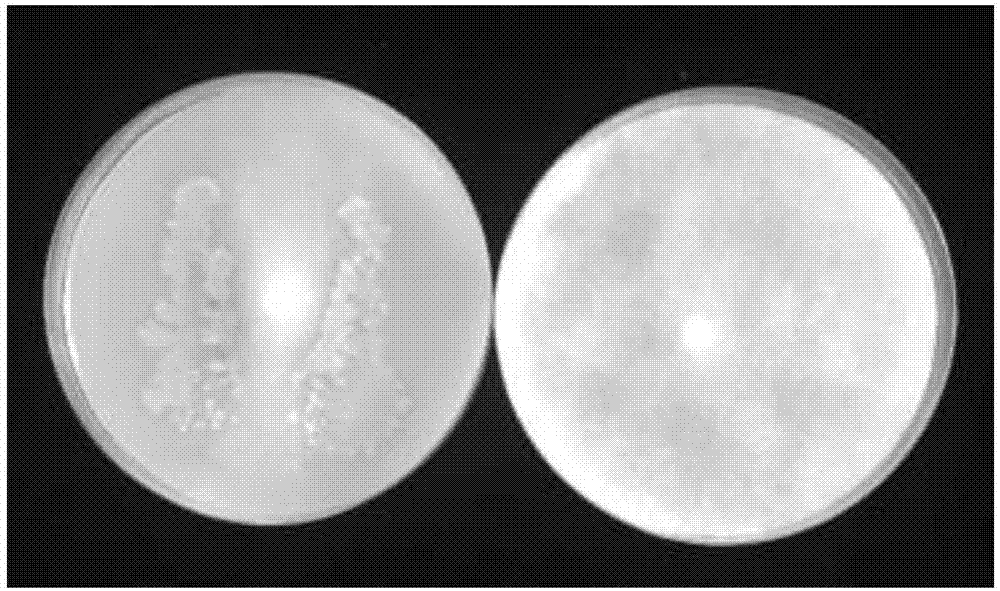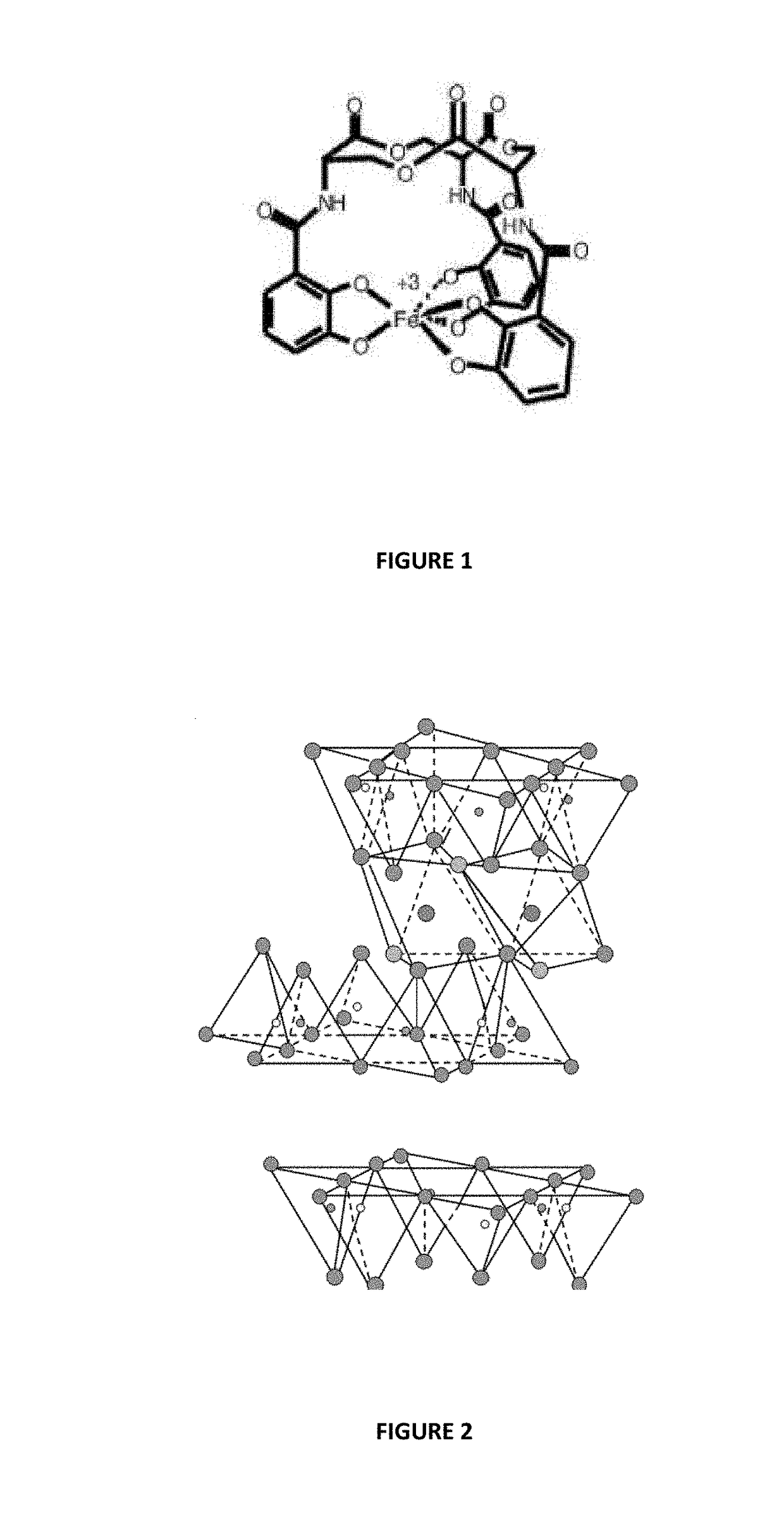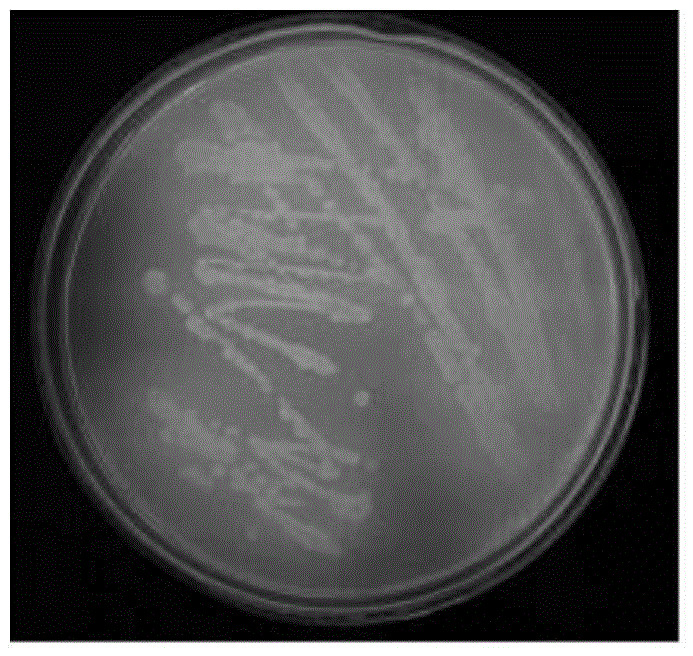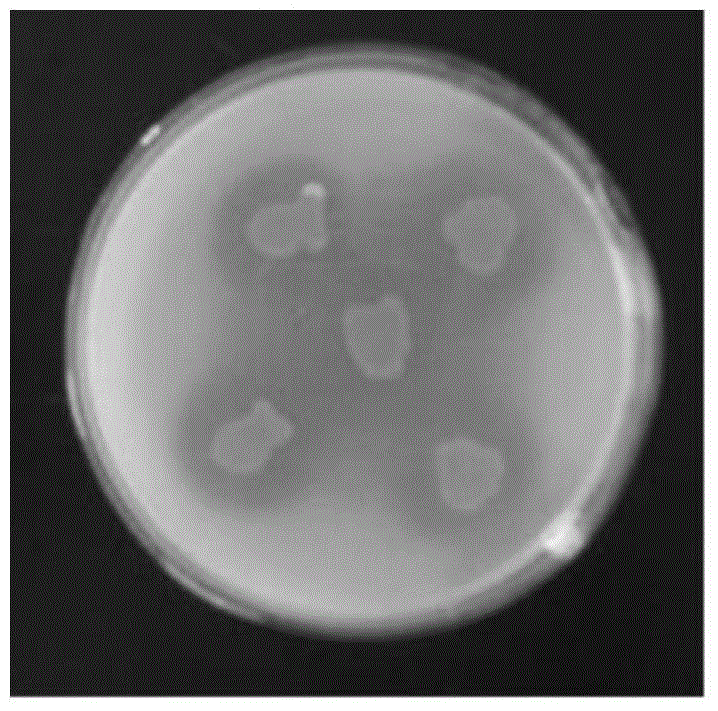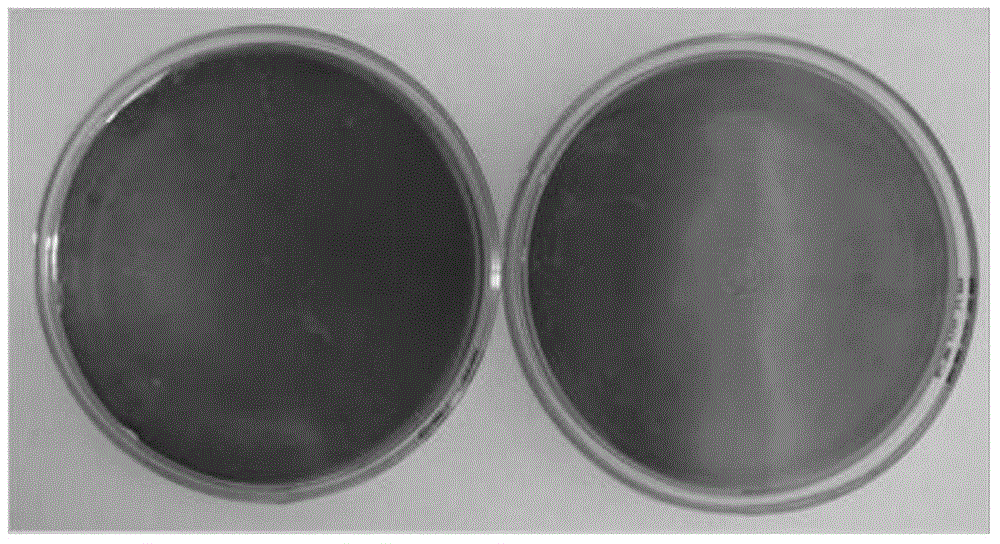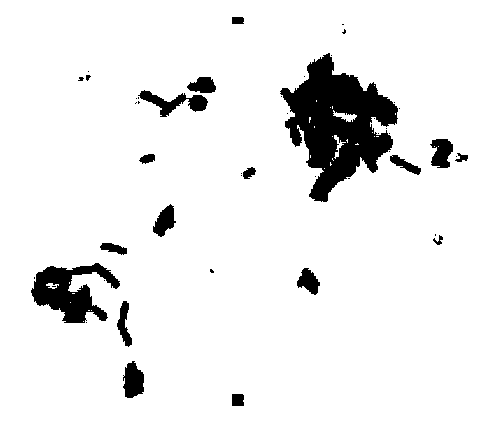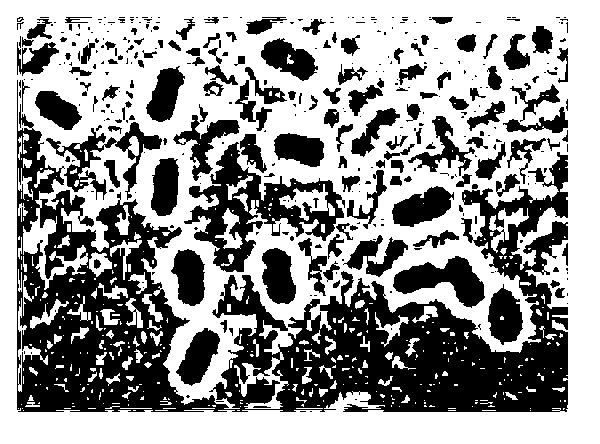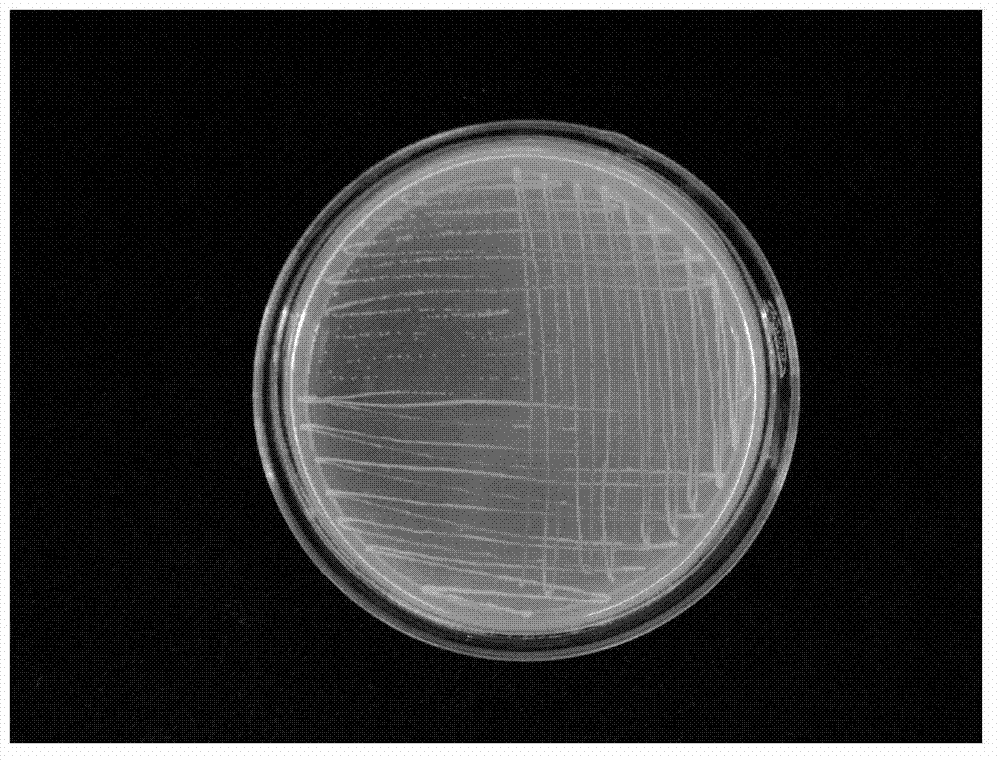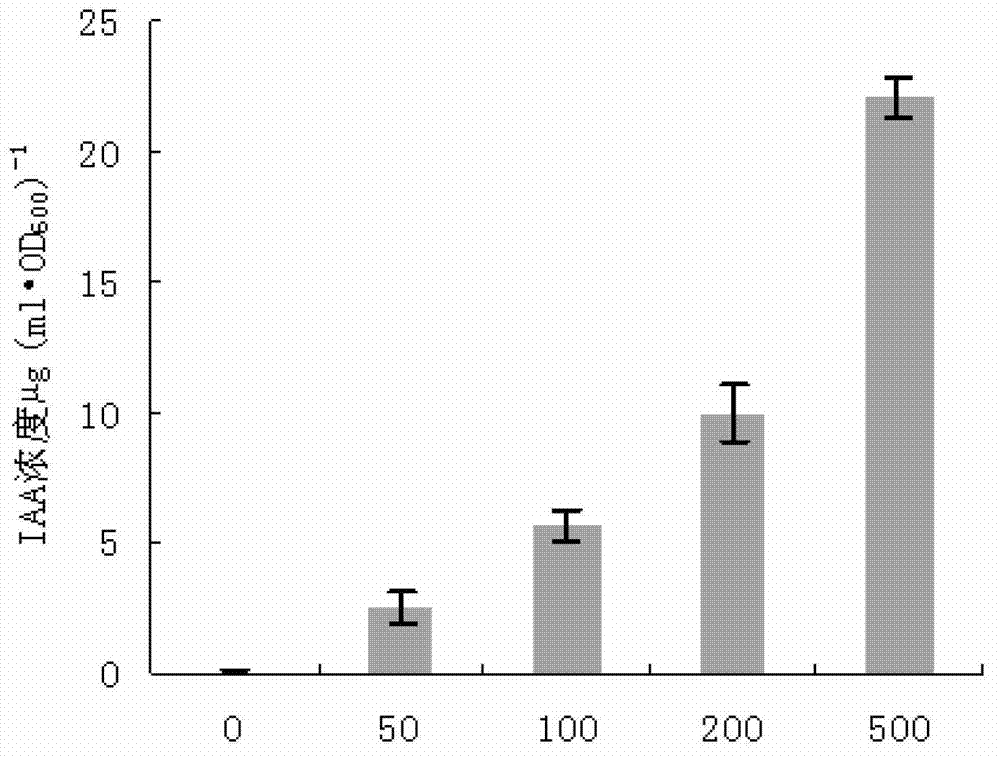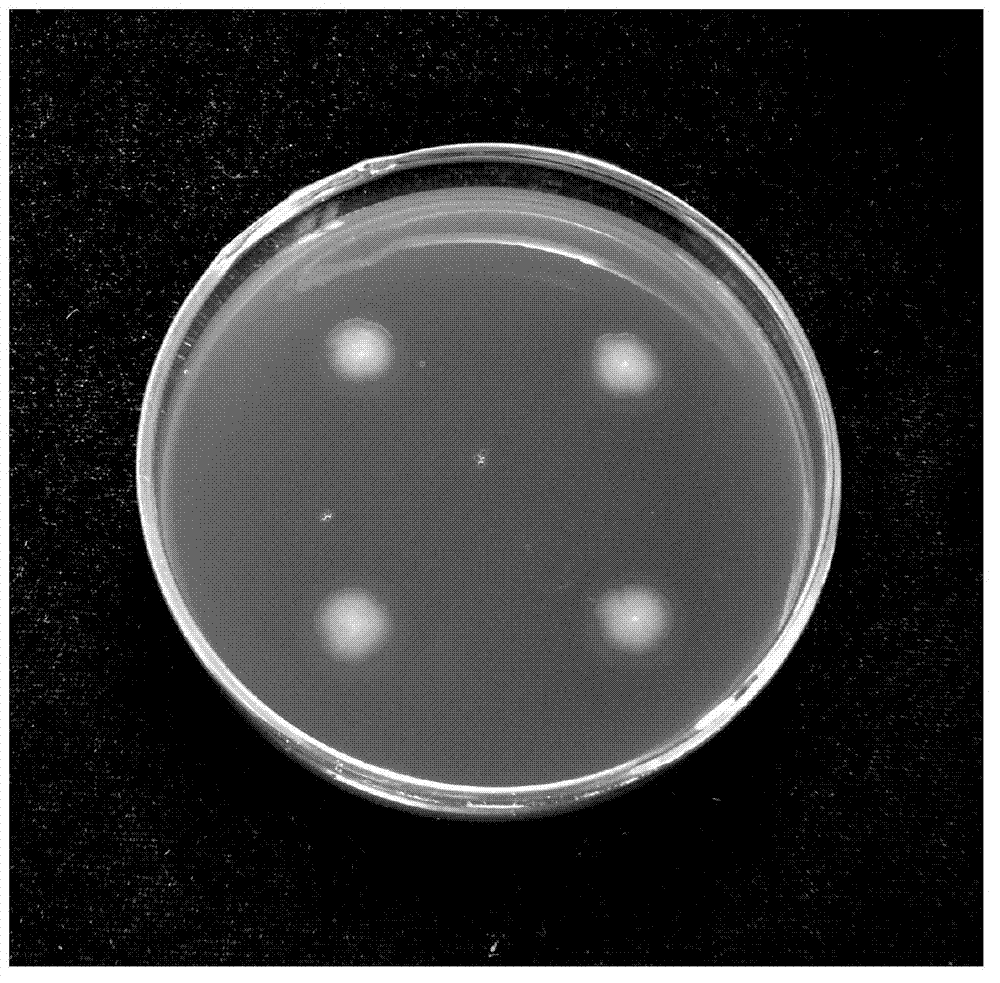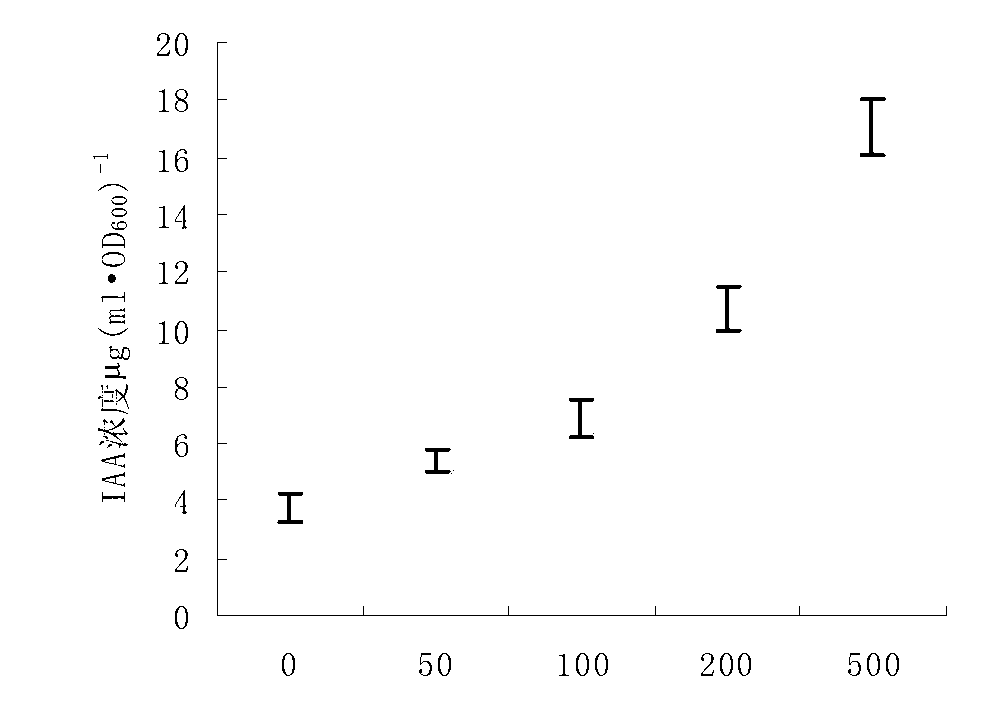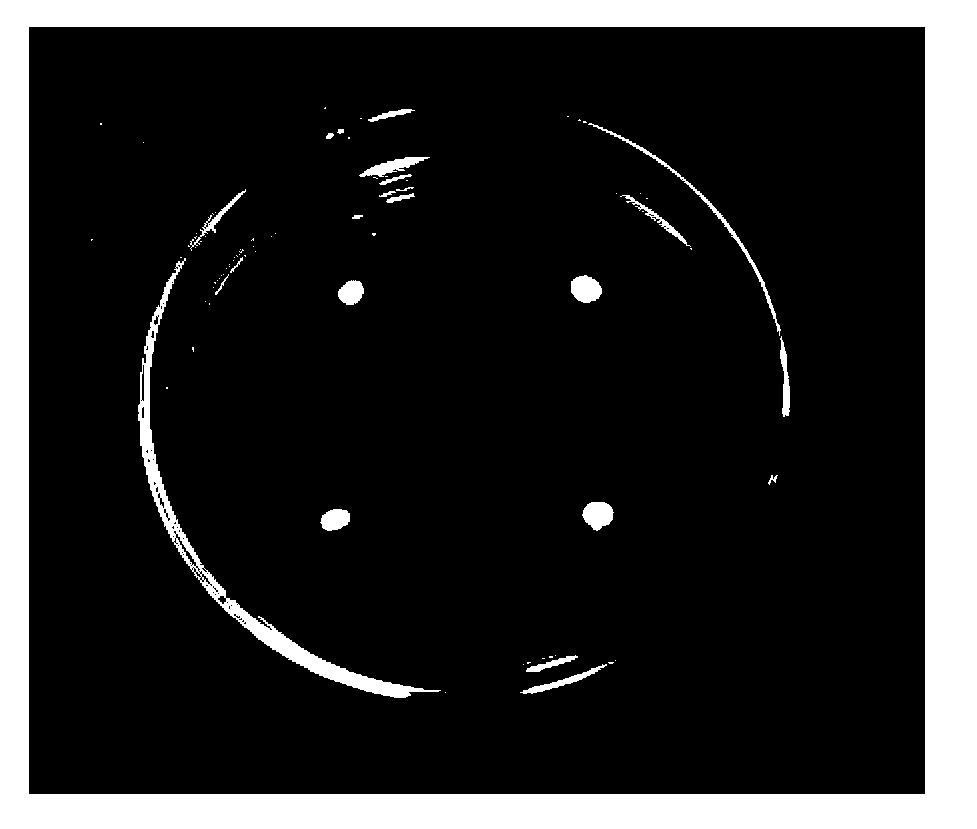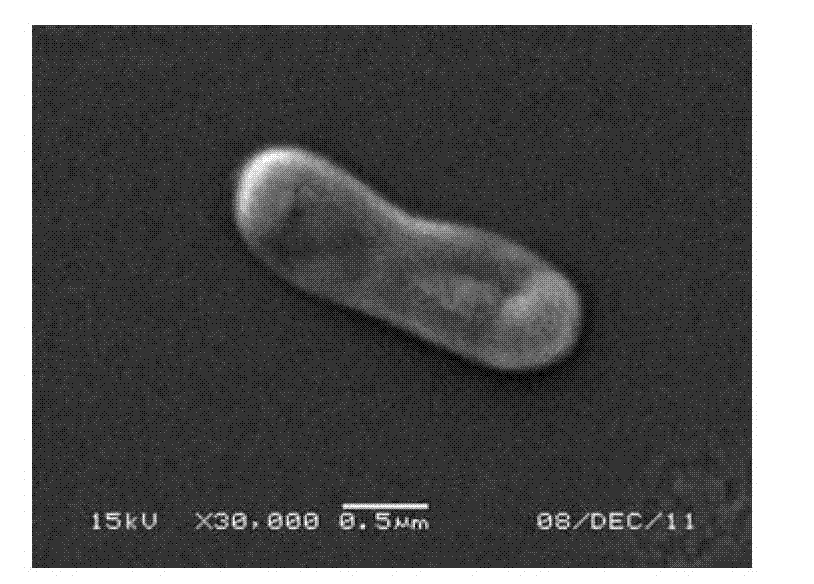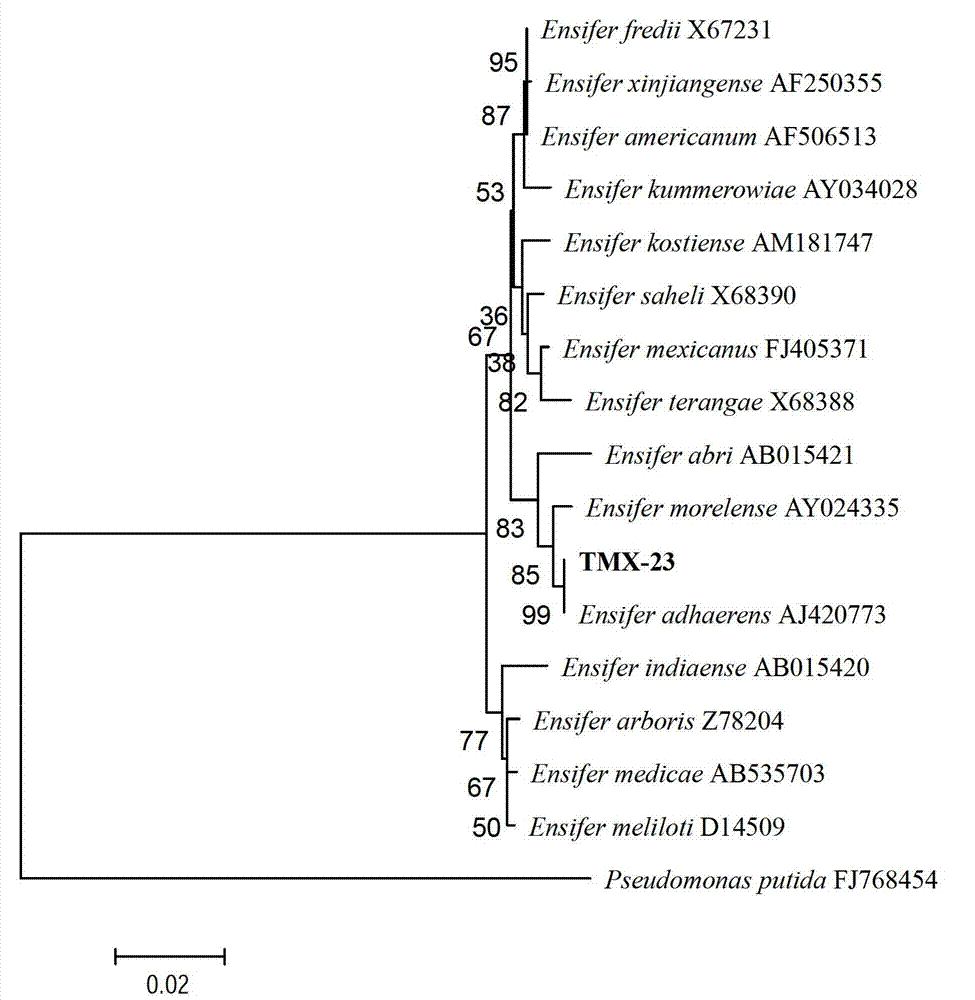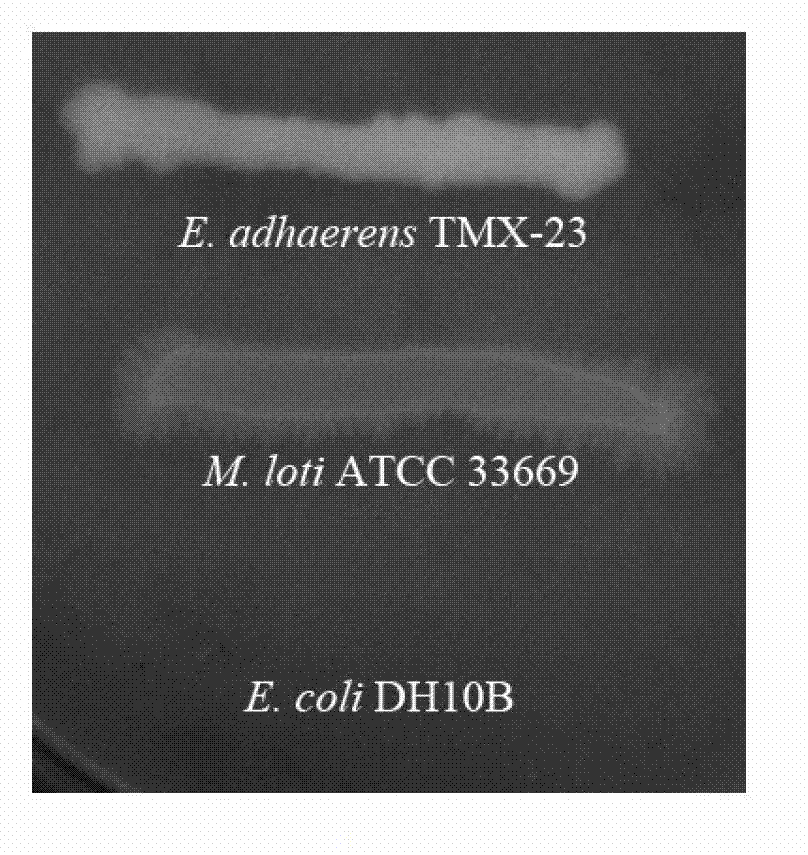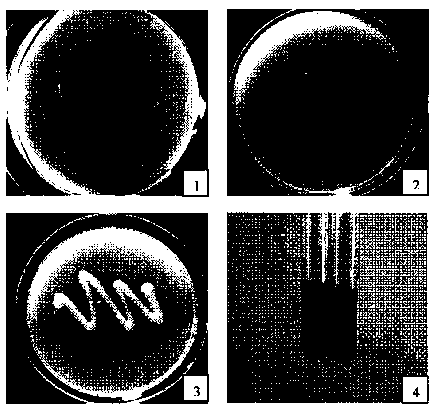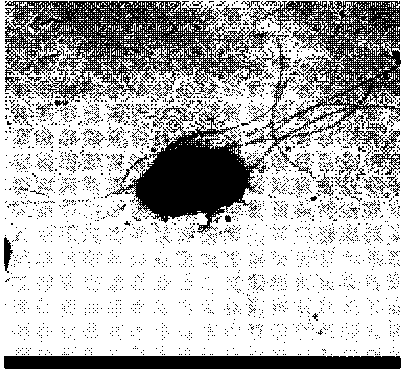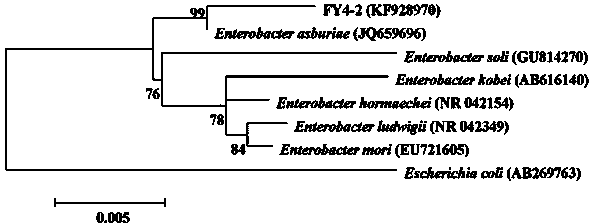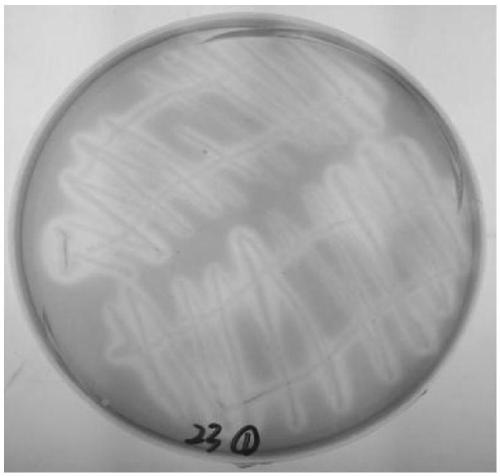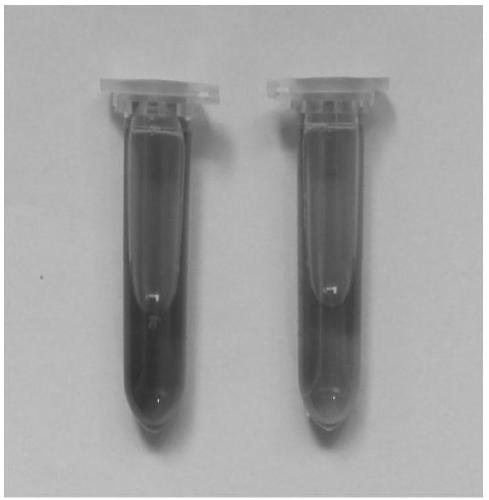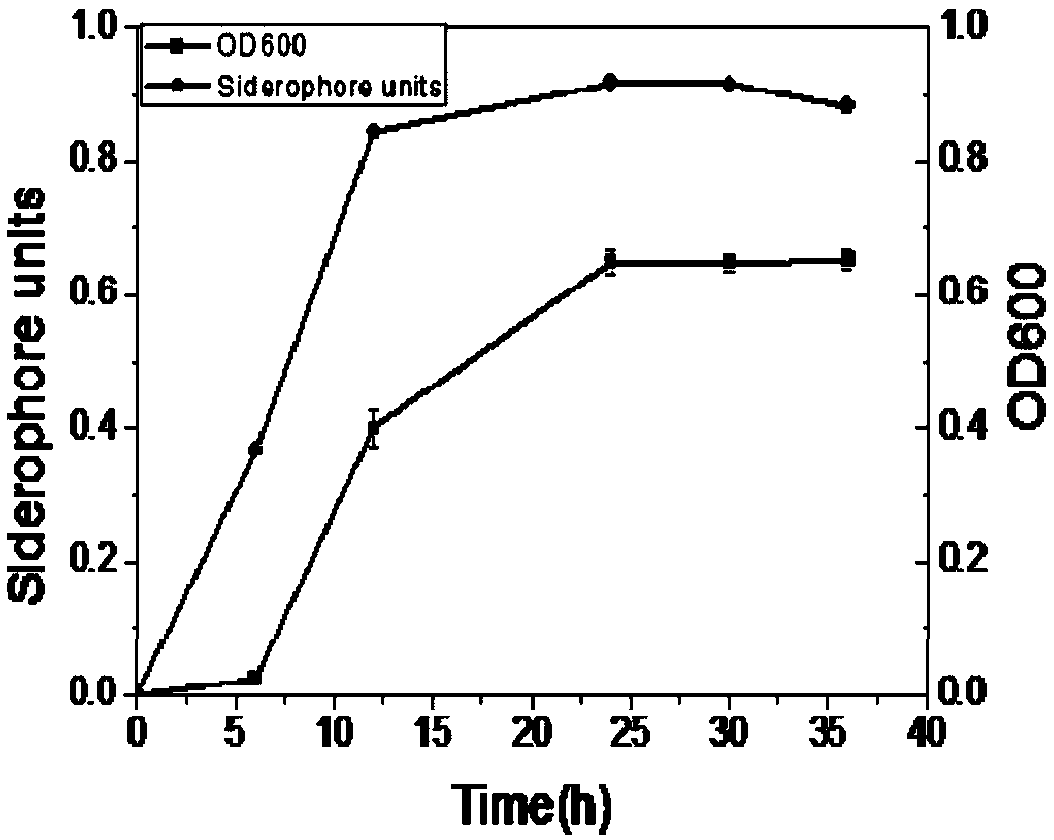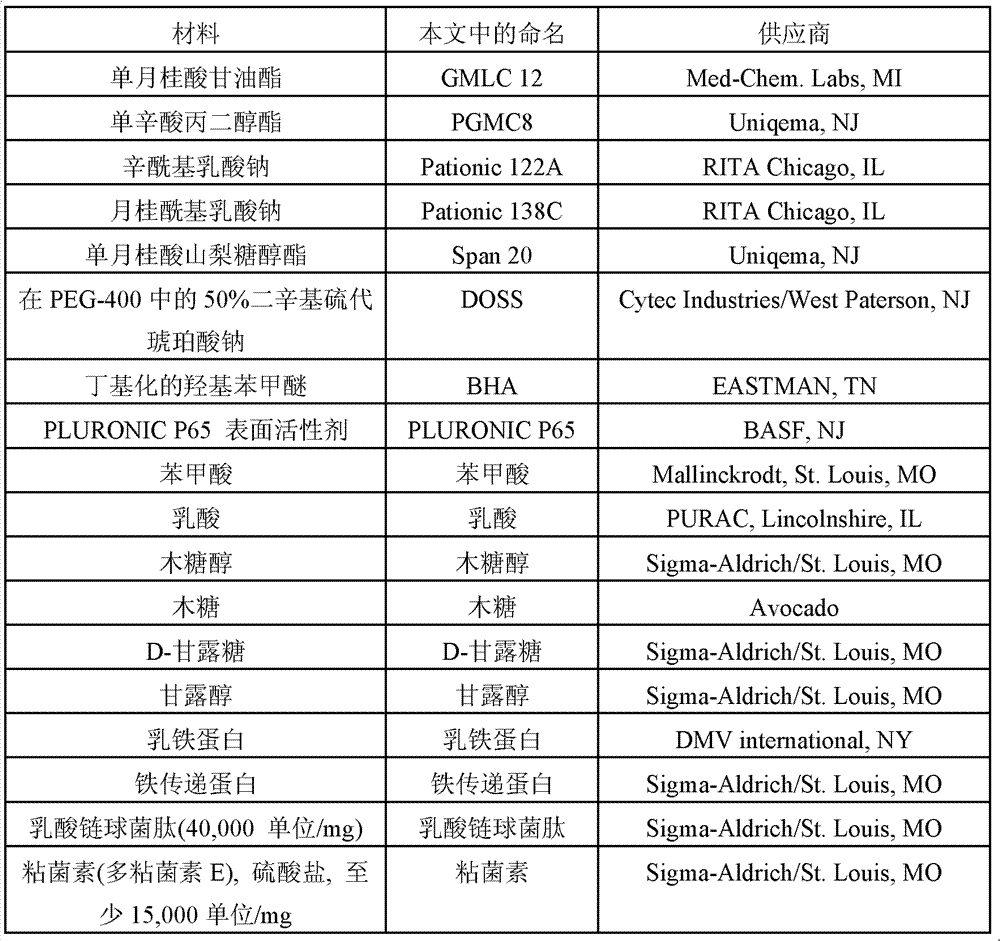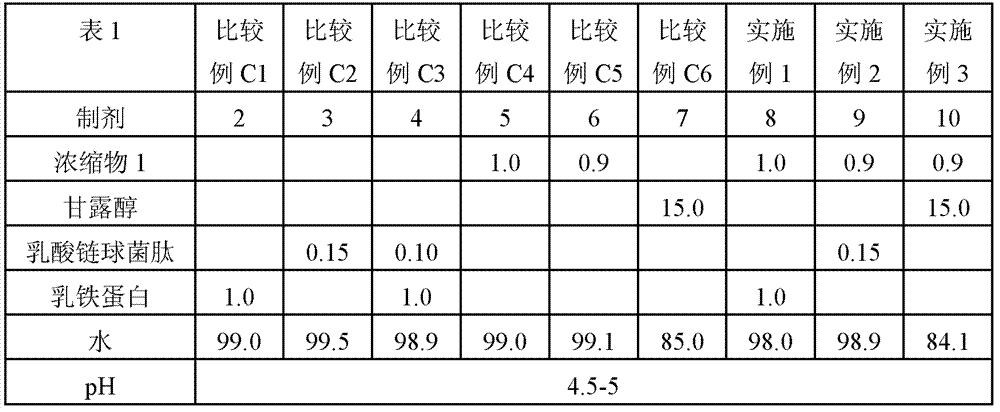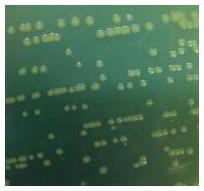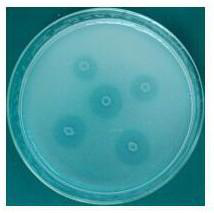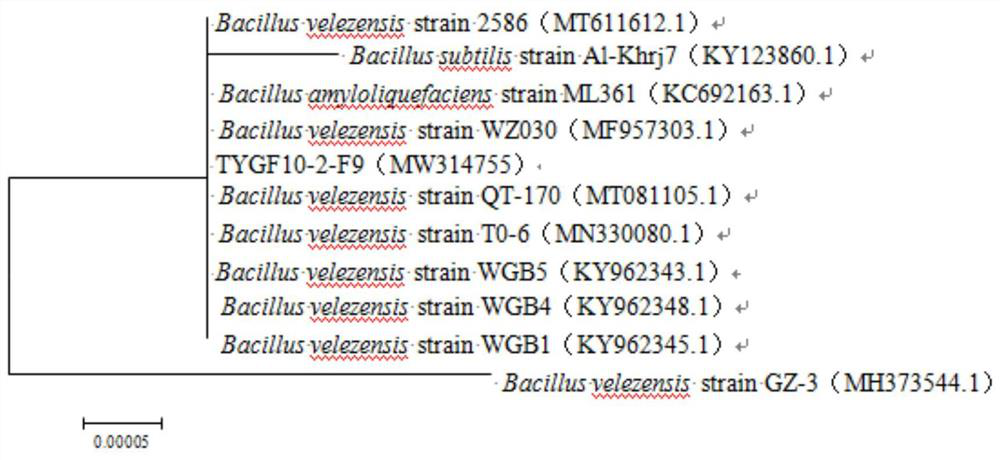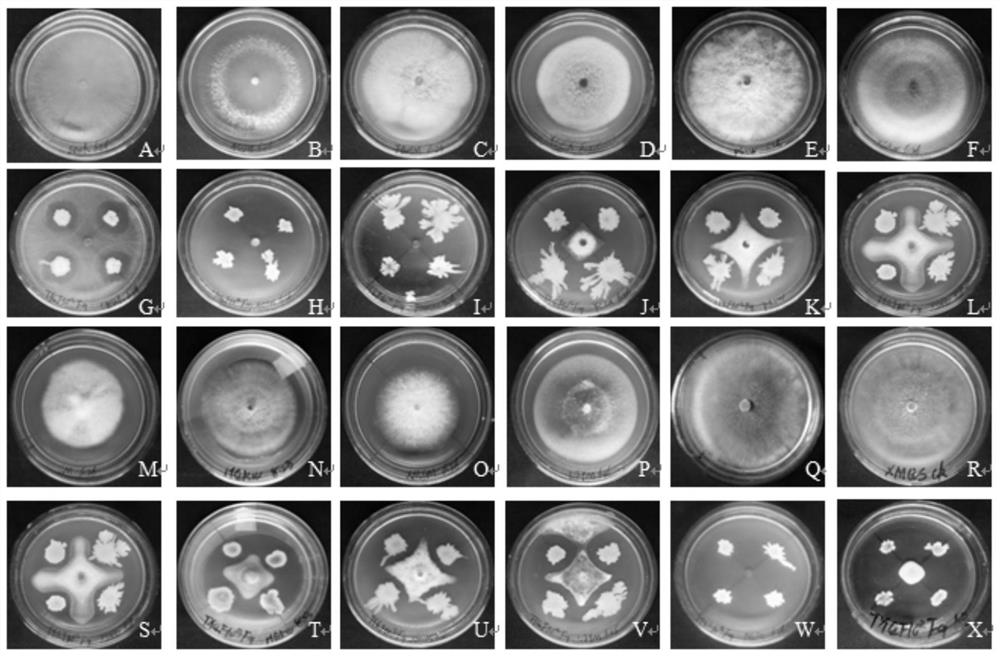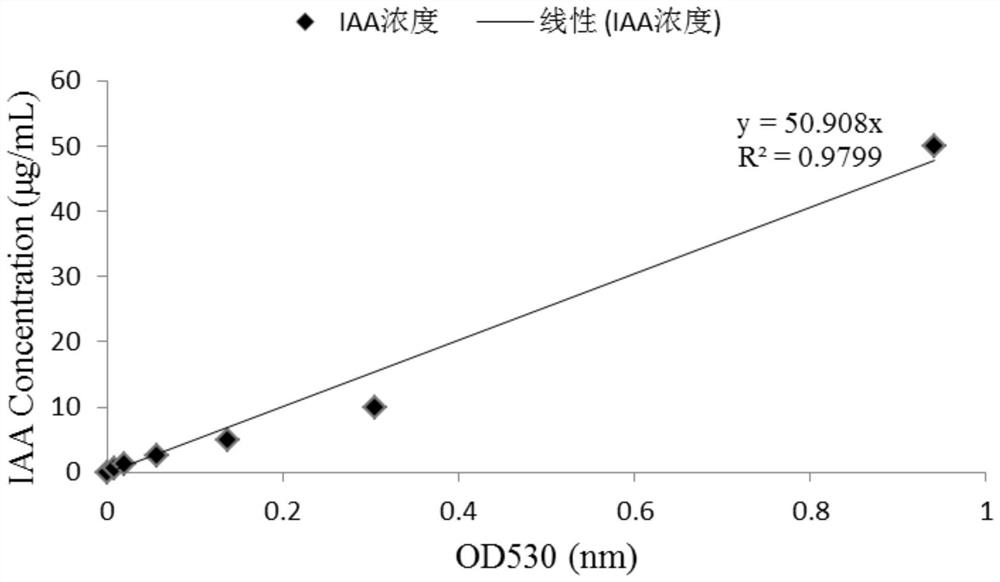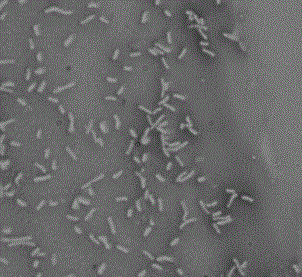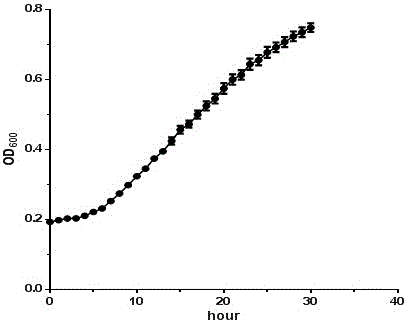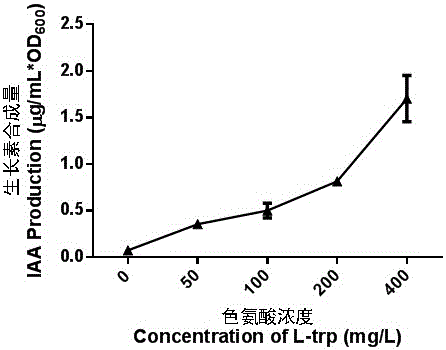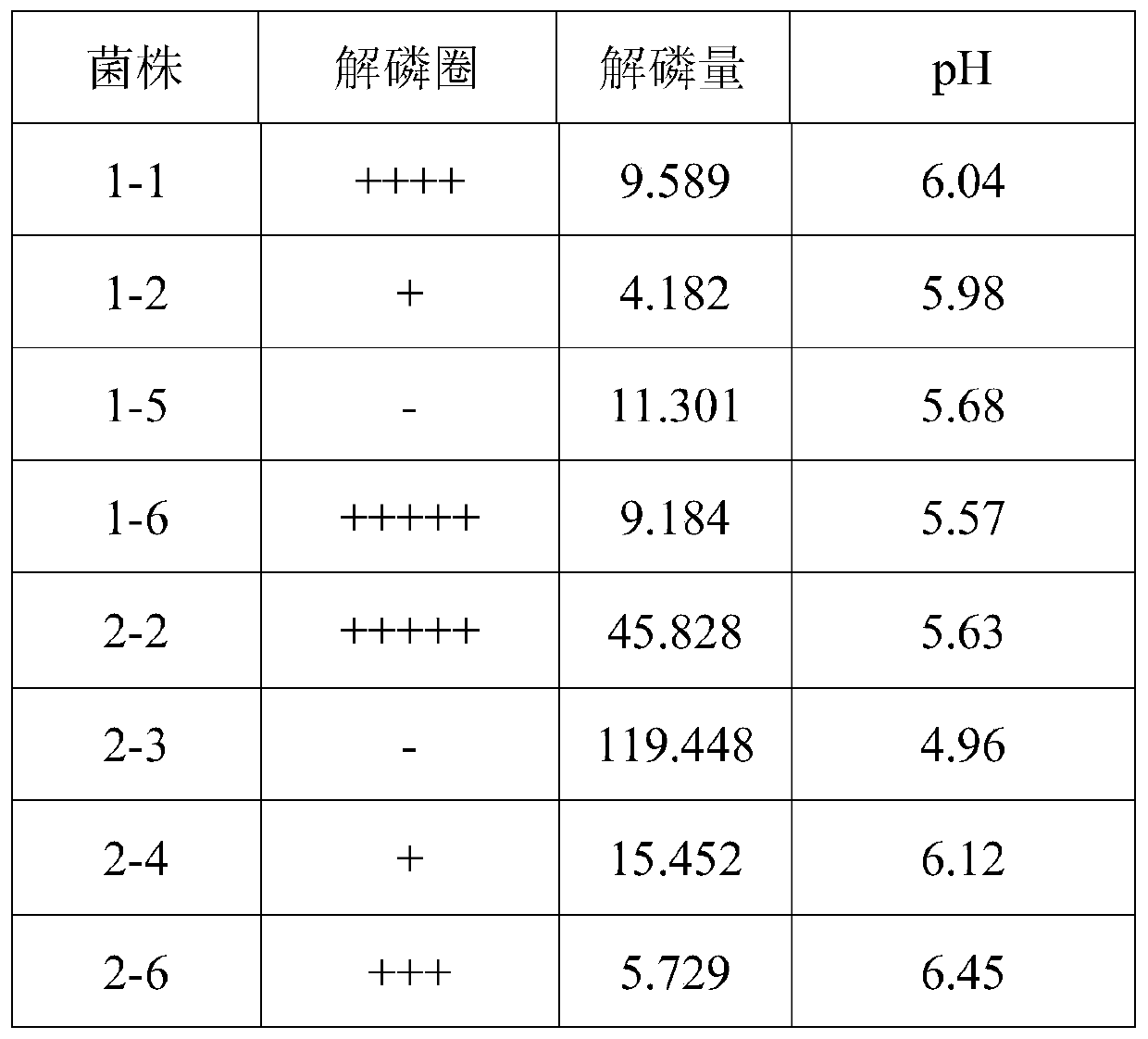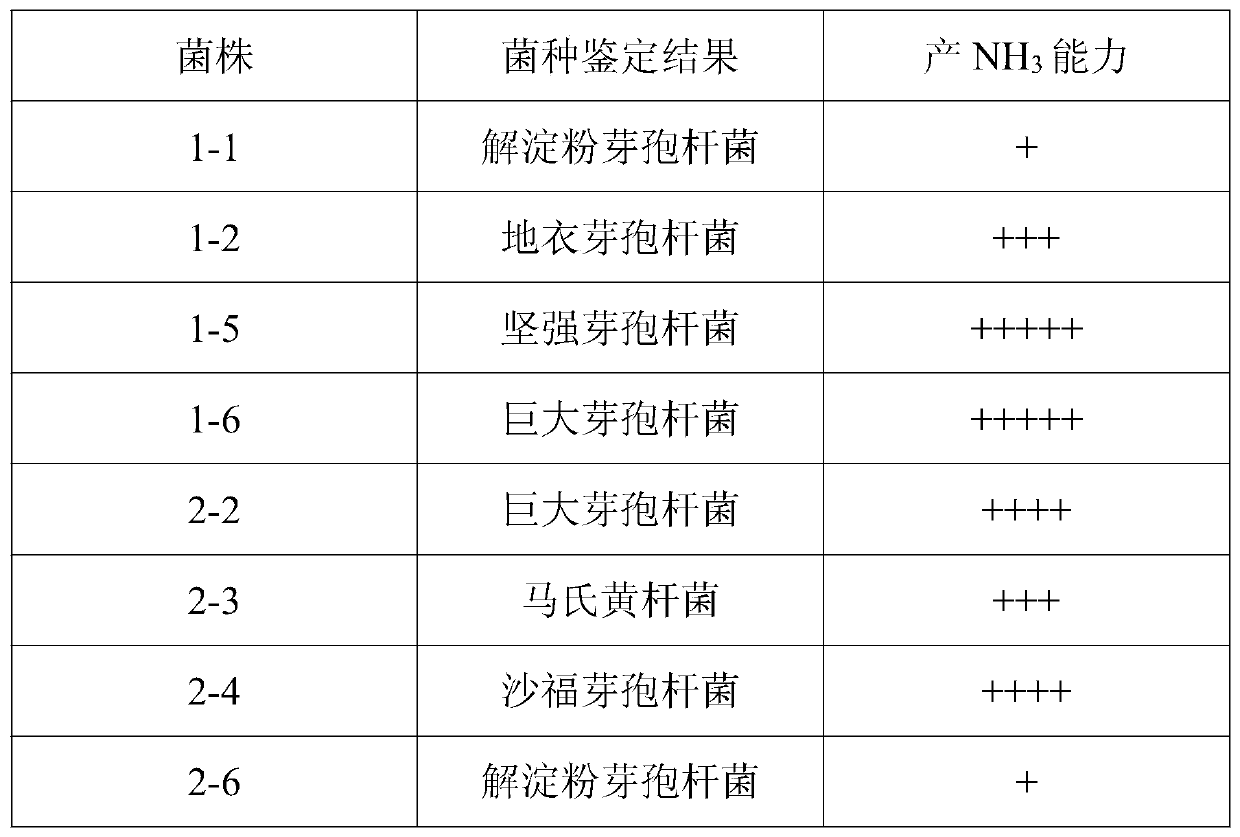Patents
Literature
269 results about "Siderophore" patented technology
Efficacy Topic
Property
Owner
Technical Advancement
Application Domain
Technology Topic
Technology Field Word
Patent Country/Region
Patent Type
Patent Status
Application Year
Inventor
Siderophores (Greek: "iron carrier") are small, high-affinity iron-chelating compounds secreted by microorganisms such as bacteria and fungi and serving to transport iron across cell membranes. Siderophores are amongst the strongest soluble Fe³⁺ binding agents known.
Antimicrobial compositions and methods
InactiveUS20050053593A1Easy to handleReduce Microbial ContaminationAntibacterial agentsBiocideLipid formationAlcohol sugars
The present invention is generally related to a product and process to reduce the microbial contamination on organic matter, such as processed meat, fruits and vegetables, plant parts, inanimate surfaces such as textiles and stainless steel, and in the mouth or on dental products. In particular, the invention is related to a product and process to disinfect surfaces using an antimicrobial composition containing an antimicrobial lipid, an enhancer selected from the group consisting of bacteriocins, antimicrobial enzymes, sugars, sugar alcohols, iron-binding proteins and derivatives thereof, siderophores, and combinations thereof, and optionally a surfactant.
Owner:3M INNOVATIVE PROPERTIES CO
Bacillus megaterium strain X3 and preparation method and application thereof
ActiveCN104928212APromote growthStrong antagonistic effectBiocideAgriculture tools and machinesDiseaseBacillus megaterium
The invention discloses a bacillus megaterium strain X3 and application thereof to plant growth promotion. The bacillus megaterium strain X3 is preserved in the China General Microbiological Culture Collection Center (CGMCC) on May 11, 2015 with the preservation number of CGMCC No.10803, is obtained through separation of indoleacetic acid, has the characteristics of siderophore production, phosphate solubilizing, ammonia producing, salt tolerance and disease suppression, can remarkably promote crop growth and improve corn yield, and meanwhile, can increase the diversity and the abundance of microbes in soil. The bacillus megaterium strain X3 is quick in reproduction, simple in production process, strong in adversity ability, easy to preserve and conductive to industrial production, and can not only prevent and cure soil-borne diseases but also promote plant growth when utilized to prepare a bio-fertilizer, thereby having a wide application prospect.
Owner:SOUTH CHINA AGRI UNIV
Heavy metal resistance plant growth-promoting bacteria preparation and applying method thereof
InactiveCN101671636APromote absorptionPromote growthBiocidePlant growth regulatorsHigh resistanceDisease
The invention relates to heavy metal resistance plant growth-promoting bacteria and a preparation applying method thereof, which belongs to the bioremediation field of heavy metal polluted environment. A bacteria strain D54 with a preservation number of CGMCC No. 3223 belongs to the Burkholderia sp. and has higher resistance to a plurality of heavy metals, wherein the resistances to Pb <2+>, Cd <2+>, Cu <2+>, Zn <2+> respectively reach 800 mg / L, 1500 mg / L, 150 mg / L and 2500 mg / L. In addition, the bacteria strain D54 has the plant growth-promoting functions of producing plant growth hormone (IAA), producing 1-amino-1-carboxyl cyclopropane (ACC) deaminase, secreting siderophore, dissolving inorganic phosphate, fixing nitrogen and the like, has the biological prevention functions of antagonizing plant pathogenic bacteria inbreak and the like, and can obviously improve the biomass of the plants applied the invention and improve the resistance to diseases and stresses. The number of the effective viable bacteria in liquid preparation reaches 1-2 billion / ml and the number of the effective viable bacteria in solid preparation reaches 1 billion / g. Soaking seeds for 1-2 hours in the liquidpreparation which is diluted 100 times and irrigating the diluted liquid preparation 1-2 times (10ml / kg) after 2-3 weeks of the sprouting of the seeds can effectively improve plant viable bacteria infection probability.
Owner:AGRO ENVIRONMENTAL PROTECTION INST OF MIN OF AGRI
Heavy metal resistant nodule bacterium and method of promoting tailings area plant restoration by using same
ActiveCN102936574APromote growthImprove stress resistanceBacteriaContaminated soil reclamationPlant hormoneBacterial strain
The invention belongs to the technical field of agriculture and environmental pollution improvement and relates to a heavy metal resistant plant endogenous nodule bacterium and application thereof. The heavy metal resistant nodule bacterium is preserved at the China center for type culture collection (CCTCC) with the preservation date to be 2012 / 9 / 18 and culture preservation number to be CCTCC NO:M2012357. The bacterial strain liquid preparation contains more than a billion of effective living bacteria per milliliter, and the bacterial strain solid preparation contains 0.2 billion of effective living bacteria per gram. The heavy metal resistant nodule bacterium strain can secrete plant hormones indole acetic acid (IAA) and siderophores, and resists heavy metal copper and cadmium. When plants are planted in moist soil or tailings containing heavy metal and bioremediation preparation is inoculated, the heavy metal resistant nodule bacterium can promote plant growth and absorbs heavy metal copper, can improve plant restoration efficiency, can fix sandy soil and reduces water and soil loss.
Owner:NANJING AGRICULTURAL UNIVERSITY
Acinetobacter calcoaceticus with free living nitrogen fixation and phosphorus and potassium dissolving capability and application of acinetobacter calcoaceticus
ActiveCN103789223AGuaranteed stabilityStable genetic traitsBacteriaMutant preparationBiotechnologyMicrobial agent
The invention relates to acinetobacter calcoaceticus X.L.Zhu.SGD07-3-16 with free living nitrogen fixation capability. The acinetobacter calcoaceticus is preserved in China general microbiological culture collection center, and the preservation number of the acinetobacter calcoaceticus is CGMCCNo.5455. The acinetobacter calcoaceticus is high in nitrogenase activity and phosphorus and potassium dissolving capability, and has ACC (1-aminocyclopropane-1-carboxylic acid) deaminase activity, a certain amount of indoleacetic acid can be generated, and the generation of siderophore is avoided; when an acinetobacter calcoaceticus-containing liquid or solid microbial agent is used for inoculating crops such as corns, oilseed rapes and leaf mustard, the growth of the crops can be remarkably promoted, and the yield of the crops can be increased.
Owner:西安金博瑞生态科技有限公司
Bacillus aryabhattai J5 and application thereof
ActiveCN105985922APromote growthGood effectPlant growth regulatorsBiocideDiseaseBacillus aryabhattai
The invention belongs to the field of microbial resources, and particularly discloses a strain of Bacillus aryabhattai J5 and application thereof in promoting growth of corn. The Bacillus aryabhattai J5 is collected in CGMCC (China General Microbiological Culture Collection Center) on October 15th, 2015 and is filed with the number of CGMCC NO.11508. The Bacillus aryabhattai J5 has functions of producing auxin, siderophore, ammonia and protease, dissolving phosphorus, resisting to salt, realizing antagonism, and the like. As the strain is capable of growing normally in a culture medium with salt content equal to 11%, the strain has good potential in eliminating soil salinization. As content of siderophore produced by the strain is up to 53.7%, the strain has effective disease-prevention property. By the strain, corn seed germination rate can be increased by 12.5%, and accordingly the strain has good growth promoting effect. By application of microbial inoculum prepared from the strain, corn yield is increased by 37.1%, and hundred-grain weight is increased by 35%. It is possible to develop the strain into microbial inoculum, and accordingly the strain has wide application prospect in terms of improving soil nutrient, eliminating salinization, promoting growth of plants, preventing diseases and the like.
Owner:SOUTH CHINA AGRI UNIV
Pseudomonas. chlororaphis subsp. Aurantiaca Pa40 and application thereof
The invention provides a Pseudomonas.chlororaphis subsp.Aurantiaca Pa40, preservation number of which is CGMCCNo.2764. The strain generates HCN, prolease and siderophore relative to antibacterium and has plate board inhibition effect on a majority of tested plant pathogenic fungi and a part of tested plant pathogenic bacteria. Control effect of the biocontrol strain Pa40 on rhizoctonia solani is detected by taking wheat as an indicator plant on the plate, in the greenhouses and in the fields; a result shows that the control effects of the Pa40 on the rhizoctonia solani on the plate bed, in the greenhouse and in the fields are respectively 53.97%, 68.10% and 72.46%; wherein the control effects on the rhizoctonia solani in the greenhouses and fields are higher than that of validamycin.
Owner:CHINA AGRI UNIV
Bacillus subtilis CYY-25 and application thereof
ActiveCN105296381APromote growthEnhanced inhibitory effectBiocidePlant growth regulatorsPyriculariaRoot rot
The invention discloses bacillus subtilis CYY-25 and belongs to the field of microorganisms. The bacillus subtilis CYY-25 is preserved with the preservation number CGMCC No.8995 in China General Microbiological Culture Collection Center and is capable of producing cellulase when salinity ranges from 0% to 15%. The bacillus subtilis CYY-25 is capable of synthetizing IAA and siderophore, dissolving sparingly soluble inorganic phosphorus, promoting plant growth and well inhibiting multiple kinds of plant pathogenic fungi such as fusarium oxysporum, pyricularia oryzae, sclerotinia sclerotiorum, fusarium moniliforme and sclerotinia sclerotiorum, is of great significance to prevention and control of alfalfa root rot and is suitable for being developed and used as an agricultural fungicide.
Owner:HARBIN NORMAL UNIVERSITY
Bacillus methylotrophicus F7 and application thereof
PendingCN106754489AStrong antagonistic effectGood biological control effectPlant growth regulatorsBiocideRalstonia solanacearumPlant growth
The invention discloses bacillus methylotrophicus F7 and an application thereof. The invention aims at providing a strain which has a plurality of beneficial properties, namely producing siderophore, cellulase and protease, producing auxin, producing ammonia and the like; the strain not only can be used for effectively inhibiting various pathogenic bacteria such as ralstonia solanacearum, fusarium oxysporum f.sp.cubense, colletotrichum gloeosporioides, fusarium oxysporum f.sp cucumerinum but also can promote plant growth. In accordance with the technical scheme, the bacillus methylotrophicus F7 is preserved in China General Microbiological Culture Collection Center (CGMCC) on February 1, 2016, with preservation number of CGMCC No.12124; in addition, five surfactin homologs, six fengycin homologs and three iturin homologs, which have an antibacterial effect, are extracted from fermentation liquid of the bacillus methylotrophicus F7; and the bacillus methylotrophicus F7 belongs to the field of agricultural biotechnology.
Owner:SOUTH CHINA AGRI UNIV
Bacillus atrophaeus and application thereof
The invention discloses Bacillus atrophaeus and an application thereof. The Bacillus atrophaeus JZB120050CGMCC No.10919 has stable, efficient and broad-spectrum antibacterial properties. The Bacillus atrophaeus can generate a biological membrane, has strong capability of generating siderophore, chitinase, cellulase and protease, which shows that the strain has relatively strong biocontrol potential. The control effect of fermentation liquor of the strain to tomatoes inoculated with botrytis cinerea for culturing 11d is 100% (the control effect of a 5-time diluent treatment group of JZB120050 strain fermentation liquor is 48%, the control effect of a treatment group of JZB120028 strain fermentation liquor is 50%, the control effect of a 5-time diluent treatment group of JZB120028 strain fermentation liquor is 26%, and the control effects of a blank control group, a 1000-time liquid treatment group of 3% polyoxin, and 1000-time liquid treatment group of 50% carbendazim are 0%), which shows that the strain has an effective inhibitory action on the botrytis cinerea. The strain is safe to human and domestic animals, does not have environmental pollution problems, is simple in culture condition, easy to store and suitable for industrial production, and has a good development application prospect.
Owner:BEIJING ACADEMY OF AGRICULTURE & FORESTRY SCIENCES
Wheat rhizosphere paenibacillus polymyxa WXD 6-4 and application thereof
ActiveCN105132324APromote growthEnhanced inhibitory effectBiocidePlant growth regulatorsTriticeaePaenibacillus polymyxa
The invention discloses wheat rhizosphere paenibacillus polymyxa WXD 6-4, and belongs to the field of biotechnology. The wheat rhizosphere paenibacillus polymyxa WXD 6-4 is classified and named as paenibacillus polymyxa, which is preserved in China General Microbiological Culture Collection Center with preservation number of CGMCC No. 8997. The wheat rhizosphere paenibacillus polymyxa WXD 6-4 disclosed by the invention can be used for synthesizing IAA and siderophore to dissolve insoluble inorganic phosphorus, so as to promote growth of plants, and fermentation broth can take a good inhibitory effect on cochliobolus sativus, fusarium moniliforme, fusarium oxysporum, botryis cinerea and like plant pathogenic fungi; and the wheat rhizosphere paenibacillus polymyxa WXD 6-4 is of great significance to the prevention and control of wheat root rot, and is suitable for development and utilization as an agricultural fungus.
Owner:HARBIN NORMAL UNIVERSITY
Biocidal Compositions Comprising Iron Chelators
ActiveUS20140154189A1Reduced bioavailabilityHigh activityBiocideCosmetic preparationsIron ChelatorBioavailability
The present invention, therefore, is directed to an antimicrobial compositions that decreases the bioavailability of iron by introducing a higher-affinity iron-selective chelating agent capable of competing with microbial siderophores. In one aspect, the present invention relates to an antimicrobial composition including a potentiating antimicrobial composition including one or more antimicrobial agents and a chelator having a weight ratio of the antimicrobial agent to the chelator from about 1:1000 to about 1000:1.
Owner:ARCH CHEM INC
Bacillus amyloliquefaciens with broad spectrum growth-promoting and stress-resisting effects
ActiveCN106591193AImprove drought toleranceImprove salt toleranceBiocidePlant growth regulatorsHigh phosphateBacterial strain
The invention provides a bacillus amyloliquefaciens ZCM18 with broad spectrum growth-promoting and stress-resisting effects. The preservation No. of the bacillus amyloliquefaciens ZCM18 is CGMCC No.12959. The bacterial strain has higher phosphate solubilization and nitrogen fixation capability and capability of generating IAA, ACCD, siderophore and cytokinin; the tolerance of salinity can reach up to 5%; the bacillus amyloliquefaciens has higher antagonism to fusarium and rhizoctonia pathogenic bacteria and is suitable for the production of multifunctional bio-fertilizer, such as, disease prevention, growth promoting and salt and alkali resistance; the application scope is wide; the bacillus amyloliquefaciens is suitable for biological improvement of various soil (saline-alkali soil, degenerated soil and conventional cultivated land) and production of various plants (vegetables, grain crops and fruit trees); the bacillus amyloliquefaciens has obvious effects in boosting the root development, preventing and controlling root diseases, increasing the crop yield, and the like; the bacillus amyloliquefaciens is capable of reducing the dosage of chemical fertilizers and pesticides and is wide in application prospect.
Owner:INST OF AGRI RESOURCES & ENVIRONMENT HEBEI ACADEMY OF AGRI & FORESTRY SCI
Bacillus amyloliquefaciens FQS38 and application thereof
The invention relates to an antibiological inoculant, wherein an effective active ingredient of the antibiological inoculant is composed of bacillus amyloliquefaciens FQS38. The antibiological inoculant is characterized by being capable of conducting colonization on the roots of tomatoes, promoting the growth of tomatoes as well as preventing and treating the soil-borne disease of the tomatoes. In addition, the antibiological inoculant can secrete protease, cellulase, siderophores, auximones, gibberellins and other antibacterial and growth promoting ingredients. The antibiological inoculant is an aqueous solution which mainly prepared from the following ingredients in proportion: bacillus amyloliquefaciens FQS38 fermentation liquor (the bacterium content is 1*1010-2*1010cfu / mL) and 0.1 to 0.5% of corrosion remover with the pH value being 5.0 to 6.0. After being diluted, the antibiological inoculant is filled into the roots of the tomatoes in the colonization process so as to prevent and treat the bacterial wilt and the marrow necrosis disease of the tomatoes; and then the subsequent root filling is carried out according to the water-fertilizer rule. After the finished drug is diluted, the effective bacterium content is 106 to 108cfu / mL. The antibiological inoculant has the advantages that the bacillus amyloliquefaciens FQS38 has a good prevention and treatment effect on the bacterial soil-borne disease of the tomatoes, can promote the growing of the tomatoes, has no toxicity and pathogenicity, is safe for people and livestock and is environment-friendly, thereby being possibly applied to field production.
Owner:JIANGSU ACADEMY OF AGRICULTURAL SCIENCES
Pennisetum purpureum Schum-derived bacillus megaterium and use thereof
ActiveCN104762228AHas nitrogen fixationPossess siderophore capacityBiocidePlant growth regulatorsBiotechnologyBacillus megaterium
The invention relates to Pennisetum purpureum Schum-derived bacillus megaterium and a use thereof and belongs to the technical field of microbes. The Pennisetum purpureum Schum-derived bacillus megaterium pp02 has a class name of Bacillus megaterium pp02, is preserved in the China general microbiological culture collection center (CGMCC) and has a preservation number of CGMCC 9415. The Pennisetum purpureum Schum-derived bacillus megaterium has iron-producing carrier, azotification and IAA production characteristics, has an IAA yield of 10.57 microgrammes per milliliter, has a strong plant root colonization ability and good salt resistance, can grow in a culture medium containing 5% of NaCl (50g / L) and is an excellent plant growth promoting endophyte strain. Through infection of hybrid pennisetum with the Pennisetum purpureum Schum-derived bacillus megaterium, plant salt resistance is substantially improved, plant growth is promoted, and fresh weight, dry weight and height of the plant above the ground are substantially improved. The Pennisetum purpureum Schum-derived bacillus megaterium has important development and application prospects in study of hybrid pennisetum microbial fertilizer and promotion of growth and development of plants in saline marginal land.
Owner:JIANGSU UNIV
Acid-resistant pseudomonas koreensis CLP-7, and applications thereof
The invention discloses an acid-resistant pseudomonas koreensis strain CLP-7 which is capable of preventing diseases and promoting growth, and can be used for biocontrol. The acid-resistant pseudomonas koreensis strain CLP-7 is preserved at China General Microbiological Culture Collection Center, on 27th, October, 2016, and the preservation number is CGMCC No.13204. The antibacterial spectrum of the acid-resistant pseudomonas koreensis strain CLP-7 is relatively large; the acid-resistant pseudomonas koreensis strain CLP-7 is capable of inhibiting growth of Phytophthora parasitica var. nicotianae, Ralstonia solanacearum, and Alternaria alternata Keissler; the antagonistic activity under acidic conditions is high, the acid-resistant pseudomonas koreensis strain CLP-7 is capable of producing siderophore, possesses protease and glucanase activity, and potassium releasing capacity. The results of biocontrol pot experiment show that the acid-resistant pseudomonas koreensis strain CLP-7 is capable of preventing under acidic soil conditions, and promoting growth and chlorophyll synthesis of tobacco seedlings in acidic soil, so that the acid-resistant pseudomonas koreensis strain CLP-7 and microorganism bacterium agents of the acid-resistant pseudomonas koreensis strain CLP-7 can be used for preventing tobacco fungi and bacterial root and stem diseases under continuous cropping or acidic soil conditions effectively, and is high in application value.
Owner:TOBACCO RES INST CHIN AGRI SCI ACAD +1
Solid Granulated Fertilizer Formulated with Mineral Clays, Siderophore Chelating Agents, Secondary Nutrients and Micronutrients
Owner:MIRANDA VALENCIA JOSE LUIS
Siderophores-producing bacillus and applications thereof
ActiveCN104263684AImprove Iron NutritionIncrease chlorophyll contentPlant growth regulatorsBiocidePotassiumCulture mediums
The invention discloses a siderophores-producing bacillus. The strain is paenibacillus illinoisensis preserved in China General Microbiological Culture Collection Center (CGMCC) on August 29, 2014, wherein the address of CGMCC is Courtyard No.3, No. 1 of Beichen West Road, Chaoyang District, Beijing, and the Preservation No. is CGMCC No. 9620. The strain of the siderophores-producing bacillus can produce siderophores in an iron-limited culture medium. Under the conditions of pots and fields, after a bacterium suspension of the siderophores-producing strain of the siderophores-producing bacillus is subjected to seed soaking treatment before peanut seeding and is subjected to root-irrigation treatment in the growth period; in calcareous soil, the strain can obviously improve the iron nutrition of peanuts in the growth period, and can increase the chlorophyll content of peanuts, enhance the root activity of peanuts, promote the accumulation of nitrogen, phosphorus and potassium in peanut plant bodies, increase the biomass of plants, improve the quality of peanuts and increase the yield of peanuts.
Owner:SHANDONG AGRICULTURAL UNIVERSITY
Pseudomonas putida SRPG-396 and salt-dissolving and growth-promoting application thereof
InactiveCN104531546AMitigate the hazards of salt stressImprove germination ratePlant growth regulatorsBiocideEcological environmentDry weight
The invention relates to pseudomonas putida SRPG-396 and salt-dissolving and growth-promoting application thereof, and belongs to the field of agricultural biotechnology. The accession number of the bacterial strain is CGMCC No. 9397. The bacterial strain has the functions of dissolving inorganic phosphorus, and secreting auximone and siderophore, can improve the absorption of elements such as nitrogen, phosphorus, potassium, calcium, iron, and the like by crops, reduce the absorption of sodium, has good salt resistance, can effectively relieve salt stress of crops caused by salinized soil and promote growth of crops under salt stress. When compared with a control, the bacterial strain can significantly improve the germination rate, dry weight, and plant height of crops such as cotton, tomatoes, capsicum and the like under salt stress. The bacterial strain of the invention has the advantages of stable functions, strong environment adaptability, and ecological environment friendliness, can be prepared into products such as microbial agents, biological fertilizers, and the like, has great development potential for industrial products, and has good application prospects.
Owner:BEIJING INSTITUTE OF TECHNOLOGYGY +1
Bacillus subtilis for controlling citrus canker
InactiveCN103173394AGood prevention and control effectEnhanced inhibitory effectBacteriaMicroorganism based processesBiotechnologyThielaviopsis basicola
The invention relates to a bacillus subtilis CCCQ080 with stronger activity prevention for citrus canker, belonging to the field of agriculture disease biological control. The bacillus subtilis is obtained by being separated from natural environment host leaves and is identified according to the morphological characteristics and molecular biology. The bacillus subtilis has very strong inhibition effect on the citrus canker, and also has good control effect on the citrus canker. Furthermore, the bacillus subtilis also has broad-spectrum antagonistic activity, has stronger inhibition effect on pathogenic bacteria such as citrus canker pathogen and tobacco angular leaf spot pathogen, and also has good inhibition effect on pathogenic fungus such as tobacco botrytis cinerea, apple canker pathogenic bacteria and thielaviopsis basicola. The secondary metabolite of the bacillus subtilis contains cellulase, protease, siderophore and the like. The biological film of the canker pathogenic bacteria can be destroyed by the fermentation filtrate of the bacillus subtilis, and the environment-friendly biopesticide can be produced by bacterial fermentation or secondary metabolite extraction technology, so that the bacillus subtilis has important business development and application value.
Owner:SOUTHWEST UNIVERSITY
Medicago pseudomonas strain capable of producing ACC (1-aminocyclopropane-1-carboxylate) deaminase and application of medicago pseudomonas strain
ActiveCN102827793APromotes nutrient absorptionPromote growth and developmentBacteriaMicroorganism based processesCarboxylateRoot system
The invention discloses a medicago pseudomonas strain capable of producing ACC (1-aminocyclopropane-1-carboxylate) deaminase and application of the medicago pseudomonas strain, and relates to a medicago pseudomonas strain and application thereof. The pseudomonas (pseudomonas sp.) MJM-9 is preserved in the general microorganism center of the China microorganism culture preservation management committee in 26th July, 2012, and the preservation number of the pseudomonas MJM-9 is CGMCC NO.6294. The medicago pseudomonas strain containing the ACC deaminase is used as bacterial manure for growing crops. The medicago pseudomonas strain can generate the ACC deaminase, secrete auximone IAA (indole acetic acid), synthesize siderophores, reduce the concentration of ethylene inside a plant under the condition of environmental stress, promote the plant to grow fast, particularly promote growth and development of a root system of the plant, and increase utilization rate of fertilizers. Besides, when the strain is applied to agricultural production, growth of plants can be promoted, yield of crops can be increased, and stress resistance of the crops is improved.
Owner:HARBIN NORMAL UNIVERSITY
Alfalfa growthpromoting rhizobacteria MJM-11 and application thereof
ActiveCN102796684AGood regulationImprove stress resistancePlant growth regulatorsBiocideRhizobacteriaGrowth promoting
The invention discloses an alfalfa growth-promoting rhizobacteria MJM-11 and application thereof. An Enterobacter ludwigii strain MJM-11 has a preservation number of CGMCC No.6295. The Enterobacter ludwigii strain MJM-11 can be applied in at least one of the following four ways: 1, preparation of an ACC (1-aminocyclo propane-1-carboxylate) ammonialyase; 2, preparation of indoleacetic acid; 3, preparation of siderophores; and 4, promotion of the growth of plants under the saline-alkali stress. Experiments prove that the alfalfa growth-promoting rhizobacteria MJM-11 which is obtained through separation can be used for synthesizing the ACC ammonialyase and the IAA (Indole Acetic Acid) siderophores and is capable of effectively promoting the alimentation of plants in a saline-alkali stress environment, regulating the growth of plants and enhancing the stress resistance capacity of plants in adverse conditions.
Owner:HARBIN NORMAL UNIVERSITY
Ensiferadhaerens and application thereof
InactiveCN102851237AHas the ability to fix nitrogenHas PGPR activityBacteriaMicroorganism based processesBiotechnologyBenzoic acid
The invention discloses Ensiferadhaerens CGMCC 6315 which is a bacterium having a nitrogen-fixing capability. The strain is also a plant growth promoting rhizobacterium (PGPR), and can produce indoleacetic acid (IAA), extracellular polysaccharide (EPS), siderophore, salicylic acid (SA), 2,3-dihydroxybenzoic acid (DHBA), hydrogen cyanide (HCN) and ammonia. Under the stress condition of a salt containing sodium chloride, soybeans inoculated with the E.adhaerens CGMCC 6315 can have a higher germination rate in comparison with a control group which is not inoculated with the strain.
Owner:NANJING NORMAL UNIVERSITY
Gen-seng growth promoting bacteria FY4-2 and application thereof
InactiveCN103834591APromote germinationHas a facilitative functionBiocidePlant growth regulatorsBiotechnologyGrowth promotion
The invention discloses a bacteria strain FY4-2 selected from mass gen-seng endophytic bacterias; the bacteria strain FY4-2 produces auxin, azotification, phosphate dissolving, potassium releasing and ironophore, and has growth promotion function to the host gen-seng, and is identified to be enterobacterasburiae; the bacteria strain FY4-2 is strong in IAA production capacity, can reach 13.5 ug / mL, has good growth vigor under nitrogen-free condition, has azotification potential, phosphate dissolving content can be measured in quantity to be 130.6ug / mL, potassium releasing can obtain 4.33ug / mL, and can produce ironophore with activity at 92%; the bacteria strain FY4-2 can promote gen-seng seed to germinate and grow, bud length can be increased by 81.97%; the bacteria strain FY4-2 has obvious promotion effect for gen-seng root growth, fresh weight can be increased by 40.5%, and dry weight can be increased by 43.97%; the bacteria strain FY4-2 is found to provide excellent basis for developing and using gen-seng growth promotion bacterial manure.
Owner:JILIN AGRICULTURAL UNIV
Peanut rhizosphere pseudomonas fluorescens and application thereof
ActiveCN109666608AHas a growth-promoting effectImprove Iron NutritionBiocidePlant growth regulatorsPotassiumGrowth promoting
The invention discloses a peanut rhizosphere pseudomonas fluorescens and application thereof, wherein the pseudomonas fluorescens is named as 1502 IPR-01, and the preservation number is CGMCCNO. 16925. The peanut rhizosphere pseudomonas fluorescens 1502 IPR-01 is Gram-stained negative bacteria, has no spore, and has strong iron production carrier capacity; and the generated iron carrier has betteriron chelation capacity. The pseudomonas fluorescens 1502 IPR-01 and the microbial inoculum thereof have the capability of producing high-yield iron carriers, thereby improving the active iron content of new leaves of the peanuts obviously, improving the iron nutrition of the peanuts, generating auxin to promote the development of side root systems, improving the configuration of the root systems, promoting the improvement of the nitrogen, phosphorus and potassium content of plants, reducing the sodium content of plants, improving the salt stress resistance, promoting the growth of peanuts obviously, improving the biomass and the yield of the peanuts and other growth promoting functions. Pseudomonas fluorescens 1502 IPR-01 of the present invention has a positive effect on plant growth promotion.
Owner:CHINA AGRI UNIV
Antimicrobial compositions and methods
Owner:3M INNOVATIVE PROPERTIES CO
Burkholderia cepacia P10 and application thereof
ActiveCN109913393AGreat potentialPromote growthBiocidePlant growth regulatorsBiotechnologyMicrobial agent
The invention discloses Burkholderia cepacia P10 and application thereof. The Burkholderia cepacia P10 is named Burkholderia cepacia, and is collected at the China General Microbiological Culture Collection Center on March 18, 2019, wherein the collection number is CCTCC NO: M 2019172. The Burkholderia cepacia P10 has the functions of dissolving inorganic phosphorus, producing ACC deaminase and secreting iron carriers, has great potential in promotion of plant growth and development of microbial agents, and especially, has an obvious beneficial effect on the growth promotion of peanuts.
Owner:GUIZHOU UNIV
Bacillus velezensis and application thereof
ActiveCN112680382APromote growthImprove efficiencyBiocidePlant growth regulatorsBiotechnologyPlant growth
The invention discloses bacillus velezensis and application thereof. The strain is preserved China General Microbiological Culture Collection Center of China Committee for Culture Collection of Microorganisms on 07 December, 2020, has a preservation number of CGMCC No. 21318 and has a preservation number of Bacillus velezensis TYGF10-2F9. By applying the strain to the field of agricultural biocontrol, a biomembrane can be formed and is stably colonized at rhizosphere of plants, can generate a relatively high and broad-spectrum inhibiting action on 12 kinds of plant pathogenic fungi and oomycetes, and substances such as IAA and siderophore can be generated to promote plant growth. Fermentation liquor of the bacillus velezensis has the prevention efficiency of 80.99% to sclerotinia rot of rape pot culture; and a suspension or fermentation liquor of the bacillus velezensis has the prevention efficiency of 66.67% to cucumber wither pot culture, the strain plays a certain role in promoting growth of cucumbers, is a biological control strain with excellent performance and has a good development application prospect.
Owner:NORTHWEST A & F UNIV
Rhizobium Scot1305 and application of rhizobium Scot1305 in promoting phytoremediation of heavy metal pollution of soil
ActiveCN106167774AImprove repair effectIncrease enrichment contentBacteriaContaminated soil reclamationRoot noduleSecreted substance
The invention provides rhizobium Scot1305 and a symbiotic system of rhizobium Scot1305 and plants is established. Due to nitrogen fixation function, siderophore secretion function and soluble phosphorus activity of the rhizobium strain and protection effect of the rhizobium strain on key enzyme of plant tocopherol synthesis, enhancement effect of the strain on phytoremediation of Co contaminated soil is realized. The strain can coexist with plants in Co contaminated soil, and can promote the extraction and enrichment of heavy metals Co in the aerial parts of plants, and finally achieve the purpose that the content of Co in soil meets the environmental safety standard.
Owner:SICHUAN INST OF ATOMIC ENERGY
Multiple-effect plant growth-promoting bacteria and isolation and screening method thereof
ActiveCN110484470AObvious nutrient conversion effectEasy to colonizeBacteriaMicrobiological testing/measurementGrowth plantRhizobacteria
Multiple-effect plant growth-promoting bacteria and an isolation and screening method are disclosed. The invention belongs to the field of agricultural microbiology and specifically relates to multi-effect plant growth-promoting rhizobacteria with phosphorus-solubilizing, NH3-producing, plant growth hormone-producing and siderophore-producing effects. The preservation number of the multi-effect plant growth-promoting bacteria is CGMCC No. 14664. The multiple-effect plant growth-promoting bacteria are applied to fertilizers and microbial inoculants. The isolation and screening method of the invention includes sampling, cultivation of strains, identification and selection of strains, preliminary selection of strains, re-selection of strains, signing of strain performance and identification of multi-effect strains.
Owner:ZHEJIANG ACADEMY OF AGRICULTURE SCIENCES +1
Features
- R&D
- Intellectual Property
- Life Sciences
- Materials
- Tech Scout
Why Patsnap Eureka
- Unparalleled Data Quality
- Higher Quality Content
- 60% Fewer Hallucinations
Social media
Patsnap Eureka Blog
Learn More Browse by: Latest US Patents, China's latest patents, Technical Efficacy Thesaurus, Application Domain, Technology Topic, Popular Technical Reports.
© 2025 PatSnap. All rights reserved.Legal|Privacy policy|Modern Slavery Act Transparency Statement|Sitemap|About US| Contact US: help@patsnap.com
